Nav view search
Navigation
Search
Awardee List for the year 1972
| Fg Offr | Nirmal Jit Singh Sekhon 10877 F(P) | Unit : No.18 Squadron | Award Date 14 Dec 71 | Announced 26 Jan 72 | |
| Details : | 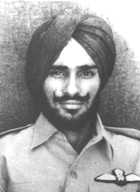 FLYING OFFICER Nirmal Jit Singh Sekhon was a pilot of a Gnat detachment based at Srinagar for the air defence of the valley against Pakistani air attacks. In accordance with the international agreement dating back to 1948, no air defence aircraft were based at Sirinagar, until the outbreak of hosti- lities with Pakistan. Flying Officer Sekhon was, therefore, unfamiliar with the terrain and was not acclimatised to the altitude of Srinagar, especially with the bitter cold and biting winds of the Kashmir winter. Nevertheless, from the outset of the war, he and his colleagues fought successive waves of intruding Pakistani aircraft with valour and determination, maintaining the high reputation of the Gnat aircraft. On 14th December 1971, Srinagar Airfield was attached by a wave of six enemy Sabre aircraft. Flying Officer Sekhon was on readiness duty at the time. However, he could not take off at once because of the clouds of dust raised by another aircraft which had just taken off. By the time the runway was fit for take-off, no fewer than six enemy aircraft were overhead, and strafing of the airfield was in progress. Nevertheless, inspite of the mortal danger of attempting to take off during an attack, and inspite of the odds against him. Flying Officer Sekhon took off and immediately engaged a pair of the attacking Sabres. In the fight that followed, at tree top height, he all but held his own, but was eventually overcome by sheer weight of numbers. His aircraft crashed and he was killed. In thus, sacrificing himself for the defience of Srinagar, Flying Officer Sekhon achieved his object, for the enemy aircraft fled from the scene of the battle without pressing home their attack against the town and the airfield. The sublime heroism, supreme gallantry, filying skill and determination, above and beyond th call of duty, displayed by Flying Officer Sekhon in the face of certain death, set new heights to Air Force traditions. FLYING OFFICER Nirmal Jit Singh Sekhon was a pilot of a Gnat detachment based at Srinagar for the air defence of the valley against Pakistani air attacks. In accordance with the international agreement dating back to 1948, no air defence aircraft were based at Sirinagar, until the outbreak of hosti- lities with Pakistan. Flying Officer Sekhon was, therefore, unfamiliar with the terrain and was not acclimatised to the altitude of Srinagar, especially with the bitter cold and biting winds of the Kashmir winter. Nevertheless, from the outset of the war, he and his colleagues fought successive waves of intruding Pakistani aircraft with valour and determination, maintaining the high reputation of the Gnat aircraft. On 14th December 1971, Srinagar Airfield was attached by a wave of six enemy Sabre aircraft. Flying Officer Sekhon was on readiness duty at the time. However, he could not take off at once because of the clouds of dust raised by another aircraft which had just taken off. By the time the runway was fit for take-off, no fewer than six enemy aircraft were overhead, and strafing of the airfield was in progress. Nevertheless, inspite of the mortal danger of attempting to take off during an attack, and inspite of the odds against him. Flying Officer Sekhon took off and immediately engaged a pair of the attacking Sabres. In the fight that followed, at tree top height, he all but held his own, but was eventually overcome by sheer weight of numbers. His aircraft crashed and he was killed. In thus, sacrificing himself for the defience of Srinagar, Flying Officer Sekhon achieved his object, for the enemy aircraft fled from the scene of the battle without pressing home their attack against the town and the airfield. The sublime heroism, supreme gallantry, filying skill and determination, above and beyond th call of duty, displayed by Flying Officer Sekhon in the face of certain death, set new heights to Air Force traditions. | ||||
| Reference: | Gazette of India , 29th January 1972 - No.7 - Pres/72 dated 20th January 1972 | ||||
| Air Chief Marsh | Pratap Chandra Lal 1567 F(P) | Unit : Air HQ | Award Date 26 Jan 72 | Announced 26 Jan 72 | |
| Details : | 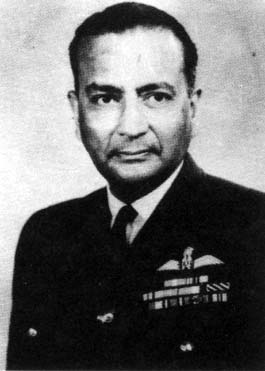 CAS CAS | ||||
| Reference: | |||||
| Air Marshal | Minoo Merwan Engineer 1614 F(P) | Unit : Western Air Command | Award Date 26 Jan 72 | Announced 26 Jan 72 | |
| Details : | 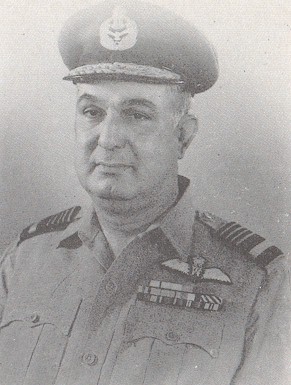 WAC WAC | ||||
| Reference: | |||||
| Air Marshal | Hari Chand Dewan 1598 F(P) | Unit : Eastern Air Command | Award Date 26 Jan 72 | Announced 26 Jan 72 | |
| Details : | 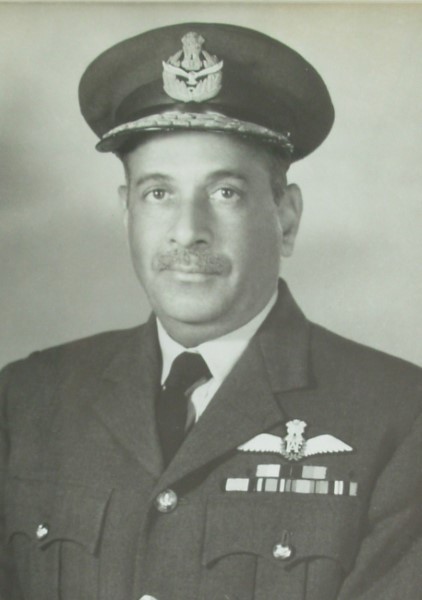 EAC EAC | ||||
| Reference: | |||||
| Air Marshal | Hirendra Nath Chatterjee 1620 F(P) | Unit : Air Headquarters (Air HQ) | Award Date 26 Jan 72 | Announced 26 Jan 72 | |
| Details : | 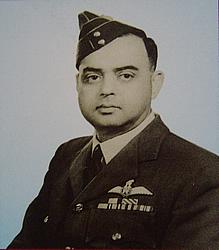 AIR MARSHAL HIRENDRA NATH CHATTERJEE, DFC, (1620) F(P) [DyCAS Air HQ] Since March 1971 Air Marshal Hirendra Nath Chatterjee was responsible for the operational training and readiness of the Air Force as a whole. He played a leading part in planning and co-ordinating the activities of the three Operational Commands during the recent war with Pakistan. Throughout his career, Air Marshal Chatterjee brought to his duties a sound knowledge of military aviation in all its aspects, and the ability to tackle the most difficult tasks in a quiet and methodical manner. Through the many important posts that he held, he did much for the development and strengthening of the Indian Air Force, leading up to its success in the recent Indo-Pak conflict. He rendered service of the most exceptional order. AIR MARSHAL HIRENDRA NATH CHATTERJEE, DFC, (1620) F(P) [DyCAS Air HQ] Since March 1971 Air Marshal Hirendra Nath Chatterjee was responsible for the operational training and readiness of the Air Force as a whole. He played a leading part in planning and co-ordinating the activities of the three Operational Commands during the recent war with Pakistan. Throughout his career, Air Marshal Chatterjee brought to his duties a sound knowledge of military aviation in all its aspects, and the ability to tackle the most difficult tasks in a quiet and methodical manner. Through the many important posts that he held, he did much for the development and strengthening of the Indian Air Force, leading up to its success in the recent Indo-Pak conflict. He rendered service of the most exceptional order. Air Marshal Hirendra Nath Chatterjee was commissioned as a Pilot in the Flying Branch of the Air Force in August, 1940. He was one of the first Flying Instructors to be trained in the IAF and made significant contribution in that capacity both during World War II and later in the development of the Air Force. He served with distinction with a Squadron in Burma Campaign, when he was awarded the Distinguished Flying Cross for gallantry. After Independence, he rendered valuable service as Chief Instructor of the Air Force Flying School, and laid the foundation of what is now the Air Force Academy. He also played an important part in setting up training facilities and framing policies and plans for the expansion of the Air Force. More recently, Air Marshal Chatterjee has been Air Officer-in-Charge Maintenance, at Air Headquarters, Air Officer Commandingin-Chief Maintenance Command and Air Officer Commanding-in-Chief Eastern Air Command. Since March 1971 Air Marshal Hirendra Nath Chatterjee has been responsible for the operational training and readiness of the Air Force as a whole. He played a leading part in planning and coordinating the activities of the three Operational Commands during the recent war with Pakistan. Throughout his career, Air Marshal Chatterjee has brought to his duties a sound knowledge of military aviation in all its aspects, and the ability to tackle the most difficult tasks in a quite and methodical manner. Through the many important posts that he has held, he has done much for the development and strengthening of the Indian Air Force, leading up to its success in the recent Indo-Pak conflict. He has rendered service of the most exceptional order. | ||||
| Reference: | Gazette of India Notification Dated : 26 Jan 1972 Number: | ||||
| AVM | Maurice Barker 1691 F(P) | Unit : Central Air Command | Award Date 26 Jan 72 | Announced 26 Jan 72 | |
| Details : | 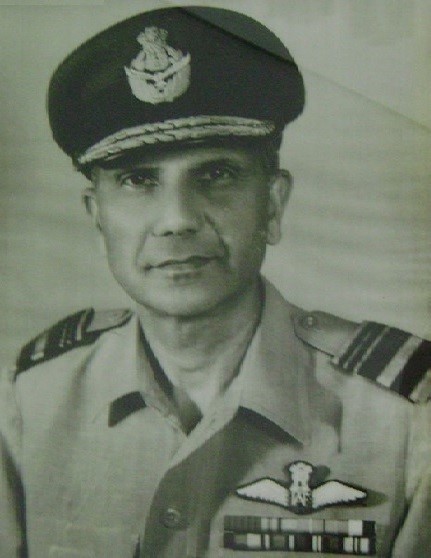 AIR VICE MARSHAL MAURICE BARKER (1691) F (P) : During the recent Indo-Pakistan war, Air Vice Marshal Barker's Command [Central Air Command] was responsible for all bomber, transport and maritime operations. Despite having been in the Command for a relatively short period of time. Air Vice Marshal Barker was able to organise his forces and control them most effectively. Under his guidance) the bomber force kept up a continuous series of attacks by night on strategic targets deep in enemy territory, both in East and West Pakistan. Later, with the neutralisation of the Pakistan Air Force in the East) his bombers played an important role in supporting our land forces by day in that area. The bombers were also used to very good effect against targets in support of the Army along the Western border. On the transport side, Air Vice Marshal Barker collaborated with Eastern Air Command to enable the latter to launch a very successful airborne operation in East Pakistan. The speed and efficiency with which the operation was mounted, and the good results achieved by it, testify to the high quality of planning and staff work that was put into it by Air Vice Marshal Barker and his staff. Likewise, valuable air support was given by the units under his control to the Navy in the Bay of Bengal and the Arabian Sea. In. undertaking the numerous and vital tasks of his Command, Air Vice Marshal Barker displayed a ready understanding of operational plans and problems, and organising ability and determination in dealing with them. His tact and personal leadership contributed much to the success of his Command's operations. He rendered distinguished service of the most exceptional order. AIR VICE MARSHAL MAURICE BARKER (1691) F (P) : During the recent Indo-Pakistan war, Air Vice Marshal Barker's Command [Central Air Command] was responsible for all bomber, transport and maritime operations. Despite having been in the Command for a relatively short period of time. Air Vice Marshal Barker was able to organise his forces and control them most effectively. Under his guidance) the bomber force kept up a continuous series of attacks by night on strategic targets deep in enemy territory, both in East and West Pakistan. Later, with the neutralisation of the Pakistan Air Force in the East) his bombers played an important role in supporting our land forces by day in that area. The bombers were also used to very good effect against targets in support of the Army along the Western border. On the transport side, Air Vice Marshal Barker collaborated with Eastern Air Command to enable the latter to launch a very successful airborne operation in East Pakistan. The speed and efficiency with which the operation was mounted, and the good results achieved by it, testify to the high quality of planning and staff work that was put into it by Air Vice Marshal Barker and his staff. Likewise, valuable air support was given by the units under his control to the Navy in the Bay of Bengal and the Arabian Sea. In. undertaking the numerous and vital tasks of his Command, Air Vice Marshal Barker displayed a ready understanding of operational plans and problems, and organising ability and determination in dealing with them. His tact and personal leadership contributed much to the success of his Command's operations. He rendered distinguished service of the most exceptional order. Air Vice Marshal Maurice Barker has been the Air Officer Commanding-in-Chief, Central Air Command since April, 1971. During the recent Indo-Pakistan war Air Vice Marshal Barker's Command was responsible for all bomber, transport, and maritime operations. Despite having been in the Command for a relatively short period of time, Air Vice Marshal Barker was able to organize his forces and control them most effectively. Under his guidance, the bomber force kept up a continuous series of attacks deep in enemy territory, both in East and West Pakistan. Later with neutralization of the Pakistan Air Force in the East, his bombers played an important role in supporting our land forces by day in that area. The bombers were also used to very good effect against targets in support of the Army along the Western border. On the transport side, Air Vice Marshal Barker collaborated with Eastern Air Command to enable the latter to launch a very successful airborne operation in East Pakistan. The speed and efficiency with which the operation was mounted, and the good results achieved by it, testify to the high quality of the planning and staff work that was put into it by Air Vice Marshal Barker and his staff. Likewise, valuable air support was given by units under his control to the Navy in the Bay of Bengal and the Arabian Sea. In undertaking the numerous and vital tasks of his Command, Air Vice Marshal Barker displayed a ready understanding of operational plans and problems, and organising ability and determination in dealing with them. His tact and personal leadership contributed much to the success of his Command's operations. He has rendered distinguished service of the most exceptional order. | ||||
| Reference: | Gazette of India Notification Dated : 26 Jan 1972 Number: | ||||
| AVM | Satya Pal Sahi 1601 ADM | Unit : Air Headquarters (Air HQ) | Award Date 26 Jan 72 | Announced 26 Jan 72 | |
| Details : | 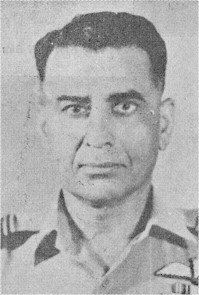 AIR VICE MARSHAL SATYA PAL SHAHI, (1601) ADM : Prior to, and during the December, 1971 conflict with Pakistan, Air Vice Marshal Satya Pal Shahi had to bear very heavy administrative responsibilities, which he had discharged most successfully. Operational plans required the setting up of additional facilities at a number of forward airfields, and there was a requirement for large increases in manpower at all operational stations. His judicious allocation of the additional manpower, made available to his Command, ensured that all operational units had the personnel they needed to fulfil their tasks. He also took steps to ensure that the organisational set up by Air Headquarters for emergency repairs of airfields would function smoothly at all the Wings within the Command. In the event, his efforts enabled airfields damaged by enemy action during night raids to be made fit for use by surprise the following morning. The close liaison he esta- blished with State Governments to ensure unbroken power supply to operational bases, and augmentation as security arrangements proved most effective. During the hostilities, he personally visited every forward airfield and outlying unit to ensure the smooth running of the administrative machinery parallel with the conduct of operations. This effort on his part had a significant effect on the morale of personnel and their families. In sum, the administrative arrangements for which he worked so hard and efficiently had a direct contributory effect on the success of air operations. With his high professional competence, dedication to duty, zeal and enthusiasm, Air Vice Marshal Shahi rendered distinguished service of a most exceptional order. AIR VICE MARSHAL SATYA PAL SHAHI, (1601) ADM : Prior to, and during the December, 1971 conflict with Pakistan, Air Vice Marshal Satya Pal Shahi had to bear very heavy administrative responsibilities, which he had discharged most successfully. Operational plans required the setting up of additional facilities at a number of forward airfields, and there was a requirement for large increases in manpower at all operational stations. His judicious allocation of the additional manpower, made available to his Command, ensured that all operational units had the personnel they needed to fulfil their tasks. He also took steps to ensure that the organisational set up by Air Headquarters for emergency repairs of airfields would function smoothly at all the Wings within the Command. In the event, his efforts enabled airfields damaged by enemy action during night raids to be made fit for use by surprise the following morning. The close liaison he esta- blished with State Governments to ensure unbroken power supply to operational bases, and augmentation as security arrangements proved most effective. During the hostilities, he personally visited every forward airfield and outlying unit to ensure the smooth running of the administrative machinery parallel with the conduct of operations. This effort on his part had a significant effect on the morale of personnel and their families. In sum, the administrative arrangements for which he worked so hard and efficiently had a direct contributory effect on the success of air operations. With his high professional competence, dedication to duty, zeal and enthusiasm, Air Vice Marshal Shahi rendered distinguished service of a most exceptional order. | ||||
| Reference: | Gazette of India Notification Dated : 26 Jan 1972 Number: | ||||
| AVM | Charan Das Guru Devasher 1867 F(P) | Unit : Eastern Air Command | Award Date 26 Jan 72 | Announced 26 Jan 72 | |
| Details : | 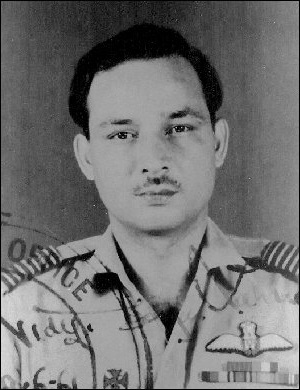 AIR VICE MARSHAL CHARANDAS GURUDAS DEVASHER, (1867) F (P) : Air Vice Marshal Devasher took over his appointment [SASO, EAC HQ] at a time when the Command itself was undergoing a process of reorganisation and the relations with Pakistan were becoming strained. He was responsible for reformulating the Command's war plans, making them bold in concept, yet simple to execute. These plans were put into action on the morning of 4th, December 1971 when our Armed Force went into action to liberate Bangia Desh. So effective were the plans that, within a few hours, the Indian Air Force had achieved total supremacy in the skies of Bangia Desh. During the period of the war in Bangia Desh) from 4th to 16th December, 1971, he controlled and co-ordinated all air activity in that sector, including para, transport and helicopter operations. The success of these opera- tions owed much to his aggressive spirit, knowledge of the use of air .power and ability to change tactics to suit the situation. On the night of 11th December, 1971, on receipt of an intercepted enemy message, he concluded that the Pakistanis had been able to build an emergency air strip in the neighbourhood of Dacca, and would attempt to land transport aircraft on it. Accordingly, he ordered night patrols by fighter aircraft over Dacca. As deduced by him, an emergency air strip was spotted at Narsingdi and put out of action, thus preventing the clandestine entry and exit of war material and personnel from Bangia Desh by air. Through- out his career in the Air Force, and especially during the recent war with Pakistan, Air Vice Marshal Devasher rendered distinguished service of the most exceptional order. AIR VICE MARSHAL CHARANDAS GURUDAS DEVASHER, (1867) F (P) : Air Vice Marshal Devasher took over his appointment [SASO, EAC HQ] at a time when the Command itself was undergoing a process of reorganisation and the relations with Pakistan were becoming strained. He was responsible for reformulating the Command's war plans, making them bold in concept, yet simple to execute. These plans were put into action on the morning of 4th, December 1971 when our Armed Force went into action to liberate Bangia Desh. So effective were the plans that, within a few hours, the Indian Air Force had achieved total supremacy in the skies of Bangia Desh. During the period of the war in Bangia Desh) from 4th to 16th December, 1971, he controlled and co-ordinated all air activity in that sector, including para, transport and helicopter operations. The success of these opera- tions owed much to his aggressive spirit, knowledge of the use of air .power and ability to change tactics to suit the situation. On the night of 11th December, 1971, on receipt of an intercepted enemy message, he concluded that the Pakistanis had been able to build an emergency air strip in the neighbourhood of Dacca, and would attempt to land transport aircraft on it. Accordingly, he ordered night patrols by fighter aircraft over Dacca. As deduced by him, an emergency air strip was spotted at Narsingdi and put out of action, thus preventing the clandestine entry and exit of war material and personnel from Bangia Desh by air. Through- out his career in the Air Force, and especially during the recent war with Pakistan, Air Vice Marshal Devasher rendered distinguished service of the most exceptional order. | ||||
| Reference: | Gazette of India Notification Dated : 26 Jan 1972 Number: | ||||
| AVM | Deviah Subia 1866 F(P) | Unit : Western Air Command | Award Date 26 Jan 72 | Announced 26 Jan 72 | |
| Details : | 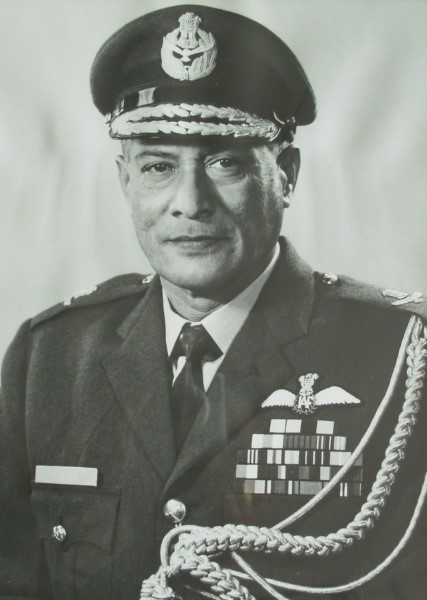 AIR VICE MARSHAL DEVIAH SUBIA, Vr. C: Air Vice Marshal Subia took over his appointment [SASO, WAC HQ] only a few months prior to the outbreak of hostilities. He made a thorough study of the requirements of air operations in the Western Sector, paying full attention to the minutest detail of each aspect of air operations. He personally studied and analysed all operational procedure and ensured that there was no ambiguity in these instructions and that they were fully understood by all concerned. He worked for long hours to ensure that Squadrons/ Units were deployed as planned with maximum economy of effort and minimum inconvenience to the personnel involved. He planned the moves in such a manner that at all stages the Squadrons retained their full operational capability to counter- act any pre-emptive strike by the enemy. He displayed remarkable organising ability in establishing within a very short period, a chain of observation posts around our forward airfields for reporting low flying aircraft. Throughout the period of hostilities, he carefully co-ordinated all aspects of operations, especially the strike missions at night. These operations involved strike forces from another Command. It was primarily due to his careful planning and foresight that all missions were successfully completed without any mishaps. His cheerful disposition and self- confidence were inspiration to his staff at the Headquarters and to Commanders in the field. Through out his career, in peace and in war, Air Vice Marshal Subia rendered distinguished service of the most exceptional order. AIR VICE MARSHAL DEVIAH SUBIA, Vr. C: Air Vice Marshal Subia took over his appointment [SASO, WAC HQ] only a few months prior to the outbreak of hostilities. He made a thorough study of the requirements of air operations in the Western Sector, paying full attention to the minutest detail of each aspect of air operations. He personally studied and analysed all operational procedure and ensured that there was no ambiguity in these instructions and that they were fully understood by all concerned. He worked for long hours to ensure that Squadrons/ Units were deployed as planned with maximum economy of effort and minimum inconvenience to the personnel involved. He planned the moves in such a manner that at all stages the Squadrons retained their full operational capability to counter- act any pre-emptive strike by the enemy. He displayed remarkable organising ability in establishing within a very short period, a chain of observation posts around our forward airfields for reporting low flying aircraft. Throughout the period of hostilities, he carefully co-ordinated all aspects of operations, especially the strike missions at night. These operations involved strike forces from another Command. It was primarily due to his careful planning and foresight that all missions were successfully completed without any mishaps. His cheerful disposition and self- confidence were inspiration to his staff at the Headquarters and to Commanders in the field. Through out his career, in peace and in war, Air Vice Marshal Subia rendered distinguished service of the most exceptional order. | ||||
| Reference: | Gazette of India Notification Dated : 26 Jan 1972 Number: | ||||
| Air Cmde | Randhir Singh 2135 F(P) | Unit : AFS Adampur | Award Date 26 Jan 72 | Announced 26 Jan 72 | |
| Details : | 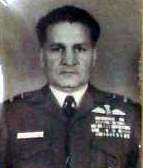 AIR COMMODORE RANDHIR SINGH, AVSM, VR C. (2135) F (P): During the recent Indo-Pak hostilities Air Commodore Randhir Singh was in command of a forward base [Adampur] in the Western Sector. He planned the defence of his base so meticulously that the enemy's Air Force was unable to attack it in any manner. As the operations progressed, he, not only frustrated the enemy's evil designs by capturing some of the agents, but was able to organise the support- ing services on the base so well that all through the operations the squadrons could provide the desired number of close support and offensive sorties with utmost effectiveness inspite of the stiff enemy opposition. His untiring zeal and outstanding leadership was an example to all personnel during the difficult days of the conflict. His overall contribution towards the air operations in the Western Sector was most commendable. He rendered distinguished services of the most exceptional order. AIR COMMODORE RANDHIR SINGH, AVSM, VR C. (2135) F (P): During the recent Indo-Pak hostilities Air Commodore Randhir Singh was in command of a forward base [Adampur] in the Western Sector. He planned the defence of his base so meticulously that the enemy's Air Force was unable to attack it in any manner. As the operations progressed, he, not only frustrated the enemy's evil designs by capturing some of the agents, but was able to organise the support- ing services on the base so well that all through the operations the squadrons could provide the desired number of close support and offensive sorties with utmost effectiveness inspite of the stiff enemy opposition. His untiring zeal and outstanding leadership was an example to all personnel during the difficult days of the conflict. His overall contribution towards the air operations in the Western Sector was most commendable. He rendered distinguished services of the most exceptional order. | ||||
| Reference: | Gazette of India Notification Dated : 26 Jan 1972 Number: | ||||
| Air Cmde | John Francis Lazaro 2944 F(P) | Unit : Western Air Command | Award Date 26 Jan 72 | Announced 26 Jan 72 | |
| Details : | 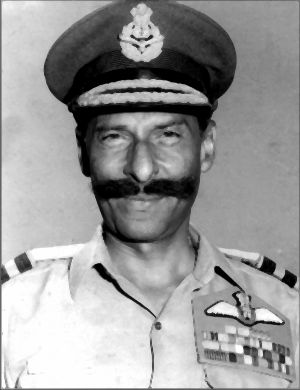 AIR COMMODORE JOHN FRANCIS LAZARO, VM (2944) F (P) :[AOC Adv HQ, WAC] In December 1971, at the time of-the Indo-Pak conflict, Air Commodore Lazaro was primarily responsible for joint planning and execution of army-air operations in the Western Sector. Under his able leadership, air operations in aid of the army achieved a new dimension. Close air support was given most effectively and the enemy's lines of communications were perpetually disrupted, isolating his forward troops. Enemy ammunition and fuel dumps were also blown up successfully, and many of his Headquarters locations destroyed. All this was done with speed and determination, despite intense enemy opposition. The officer displayed superior leadership and carried out planning of the most exceptional order. AIR COMMODORE JOHN FRANCIS LAZARO, VM (2944) F (P) :[AOC Adv HQ, WAC] In December 1971, at the time of-the Indo-Pak conflict, Air Commodore Lazaro was primarily responsible for joint planning and execution of army-air operations in the Western Sector. Under his able leadership, air operations in aid of the army achieved a new dimension. Close air support was given most effectively and the enemy's lines of communications were perpetually disrupted, isolating his forward troops. Enemy ammunition and fuel dumps were also blown up successfully, and many of his Headquarters locations destroyed. All this was done with speed and determination, despite intense enemy opposition. The officer displayed superior leadership and carried out planning of the most exceptional order. | ||||
| Reference: | Gazette of India Notification Dated : 26 Jan 1972 Number: | ||||
| Gp Capt | Malcolm Shirley Dundas Wollen 3641 F(P) | Unit : AFS Gauhati | Award Date 26 Jan 72 | Announced 26 Jan 72 | |
| Details : | 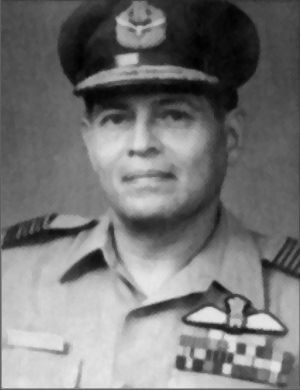 GROUP CAPTAIN MALCOLM SHIRLEY DUNDAS WOLLEN, VM (3641) F(P) : Group Captain Wollen, was the Commanding Officer of a major Air Force base [Gauhati] in Assam. On the outbreak of hostilities with Pakistan in Dec. 1971, he was placed in operational control of two MiG-21 Squadrons at a forward airfield. The task of these Squadrons was to neutralise the Pakistani Air Force in Bangia Desh and to give close support to the Army in that area. From time to time, certain special tasks were also ordered. The sum of all these tasks was very large in relation to the forces under his control. It was a measure of his organisational ability and leadership that every one of the objectives was fulfilled. The special tasks given to him included such missions as the destruction of certain selected buildings occupied by the West Pakistani forces and their Governor in Dacca city, the elimination of radio transmitting stations and the day and night bombing of certain air-fields in enemy hands. Group Captain Wollen planned, organised and conducted these operations personally, and himself gave the briefings on the tactics which the aircraft were to adopt. There was never any occasion, by day or by night, when there was any hesitation in immediately getting down to the execution of tasks given to him. The success of these operations contributed directly to the neutralisation of Pakistani air strength in Bangla Desh) support of our own surface forces, and the eventual surrender of the Pakistani forces in that Sector. With his brilliant leadership, organisational ability, ini- tiative and zeal, and the devotion to duty manifest in his outstanding career, Group Captain Wollen rendered distinguished service of the most exceptional order. GROUP CAPTAIN MALCOLM SHIRLEY DUNDAS WOLLEN, VM (3641) F(P) : Group Captain Wollen, was the Commanding Officer of a major Air Force base [Gauhati] in Assam. On the outbreak of hostilities with Pakistan in Dec. 1971, he was placed in operational control of two MiG-21 Squadrons at a forward airfield. The task of these Squadrons was to neutralise the Pakistani Air Force in Bangia Desh and to give close support to the Army in that area. From time to time, certain special tasks were also ordered. The sum of all these tasks was very large in relation to the forces under his control. It was a measure of his organisational ability and leadership that every one of the objectives was fulfilled. The special tasks given to him included such missions as the destruction of certain selected buildings occupied by the West Pakistani forces and their Governor in Dacca city, the elimination of radio transmitting stations and the day and night bombing of certain air-fields in enemy hands. Group Captain Wollen planned, organised and conducted these operations personally, and himself gave the briefings on the tactics which the aircraft were to adopt. There was never any occasion, by day or by night, when there was any hesitation in immediately getting down to the execution of tasks given to him. The success of these operations contributed directly to the neutralisation of Pakistani air strength in Bangla Desh) support of our own surface forces, and the eventual surrender of the Pakistani forces in that Sector. With his brilliant leadership, organisational ability, ini- tiative and zeal, and the devotion to duty manifest in his outstanding career, Group Captain Wollen rendered distinguished service of the most exceptional order. | ||||
| Reference: | Gazette of India Notification Dated : 26 Jan 1972 Number: | ||||
| Gp Capt | Peter Maynard Wilson 3590 F(P) | Unit : AFS Jamnagar | Award Date 26 Jan 72 | Announced 26 Jan 72 | |
| Details : | 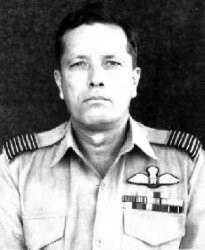 GROUP CAPTAIN PETER MAYNARD WILSON, Vr. C. (3590) F (P) : Group Captain Wilson was in Command of an Armament Training Wing [Jamnagar]. He organised the station so that, on the outbreak of the 1971 hostilities, the Wing was immediately transferred into a major operational base. The location of this base was such that its aircraft could strike deep into enemy country. For this reason, the Pakistani Air Force was quick to mount raids against the base. Due to the deception plans laid by Group Captain Wilson, the enemy bombed non-existent targets, and caused hardly any damage to the base itself, which remained fully operational throughout the war. His air defence measures resulted in the shooting down of an F-104 aircraft during a daylight raid that the enemy made on the base. With the support provided by the base, fighter aircraft stationed there were able to launch strikes against targets deep in enemy territory, inflicting severe damage and depleting his ability to wage war against India. These raids were conceived and planned by Group Captain Wilson, with such success that, despite the presence of enemy fighter and anti-aircraft defence, they were carried out without loses to our own forces. Inspite of the exposed location of the base, throughout the war, Group Captain Wilson maintained a calm and collected demeanour, which percolated throughout the Station, inspiring aircrew and ground personnel alike to great efforts and achievements. In his outstanding career, with his leadership, drive, determination and implacable will. Group Captain. Wilson rendered distinguished services of the most exceptional order. GROUP CAPTAIN PETER MAYNARD WILSON, Vr. C. (3590) F (P) : Group Captain Wilson was in Command of an Armament Training Wing [Jamnagar]. He organised the station so that, on the outbreak of the 1971 hostilities, the Wing was immediately transferred into a major operational base. The location of this base was such that its aircraft could strike deep into enemy country. For this reason, the Pakistani Air Force was quick to mount raids against the base. Due to the deception plans laid by Group Captain Wilson, the enemy bombed non-existent targets, and caused hardly any damage to the base itself, which remained fully operational throughout the war. His air defence measures resulted in the shooting down of an F-104 aircraft during a daylight raid that the enemy made on the base. With the support provided by the base, fighter aircraft stationed there were able to launch strikes against targets deep in enemy territory, inflicting severe damage and depleting his ability to wage war against India. These raids were conceived and planned by Group Captain Wilson, with such success that, despite the presence of enemy fighter and anti-aircraft defence, they were carried out without loses to our own forces. Inspite of the exposed location of the base, throughout the war, Group Captain Wilson maintained a calm and collected demeanour, which percolated throughout the Station, inspiring aircrew and ground personnel alike to great efforts and achievements. In his outstanding career, with his leadership, drive, determination and implacable will. Group Captain. Wilson rendered distinguished services of the most exceptional order. | ||||
| Reference: | Gazette of India Notification Dated : 26 Jan 1972 Number: | ||||
| Gp Capt | Chandra Kant Vishwanath Gole 3652 F(P) | Unit : AFS Halwara | Award Date 26 Jan 72 | Announced 26 Jan 72 | |
| Details : | 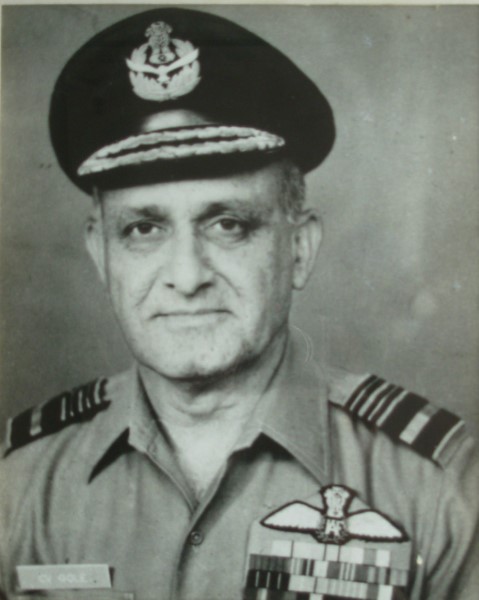 GROUP CAPTAIN CHANDRA KANT VISWANATH GOLE, AVSM, (3652) F (P): In the conflict with Pakistan, Group Captain Gole was the Station Commander of a forward base [Halwara]. With complete disregard to personal safety and with unflagging zeal, he successfully directed the air defence operations in the Punjab Sector. His base was subjected to repeated enemy air raids. On one occasion, he narrowly escaped death when a time bomb exploded very close to him, killing two. Unmindful of the incident, and even though he suffered a temporary deafness, as a result of this, he exhibited great leadership and zeal, which enabled him to meet fully the entire needs of the operational squadrons based at his station. In the discharge of his functions as a Commander, he inspired his men by his outstanding courage, selfless devotion to duty and quaJities-of fine leadership. The high morale, with which he imbued the aircrew and the ground personnel of his station, was a major contribution to the success of air operations. As a leader of men and an administrator and organiser of high ability, Group Captain Gole rendered distinguished service of the most exceptional order. GROUP CAPTAIN CHANDRA KANT VISWANATH GOLE, AVSM, (3652) F (P): In the conflict with Pakistan, Group Captain Gole was the Station Commander of a forward base [Halwara]. With complete disregard to personal safety and with unflagging zeal, he successfully directed the air defence operations in the Punjab Sector. His base was subjected to repeated enemy air raids. On one occasion, he narrowly escaped death when a time bomb exploded very close to him, killing two. Unmindful of the incident, and even though he suffered a temporary deafness, as a result of this, he exhibited great leadership and zeal, which enabled him to meet fully the entire needs of the operational squadrons based at his station. In the discharge of his functions as a Commander, he inspired his men by his outstanding courage, selfless devotion to duty and quaJities-of fine leadership. The high morale, with which he imbued the aircrew and the ground personnel of his station, was a major contribution to the success of air operations. As a leader of men and an administrator and organiser of high ability, Group Captain Gole rendered distinguished service of the most exceptional order. | ||||
| Reference: | Gazette of India Notification Dated : 26 Jan 1972 Number: | ||||
| AVM | Dadi Ardeshir Mehta 1625 F(N) | Unit : -N.A.- | Award Date 26 Jan 72 | Announced 26 Jan 72 | |
| Details : | 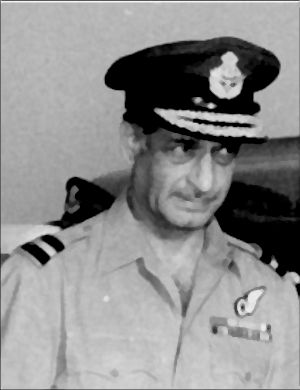 Air Vice Marshal Dadi Ardesh Mehta (1625) Flying Branch (Navigator) was posted as Senior Directing Staff (Air) at the National Defence College on 25 Jan 67 as a culmination of a distinguished career in the Indian Air Force. With his intellectual bent of mind, Air Vice Marshal Mehta has made a significant contribution to the success of this young institution. Over the years, he has devoted all his energies to the onerous task of directing the individual and syndicate studies of the student officer undergoing the course at the College. His wide knowledge of Indian and International affairs and his uncanny grasp of changing world situation have enabled him to give of his best to this institution; and thereby made it possible for the student officers to derive the maximum possible benefit from their studies. In spite of, and without regard to his rather indifferent health, Air Vice Marshal Mehta spared no pains in the planning meticulously the various tours undertaken by the student officers during the course. By his untiring efforts he ensured that the student officers saw and learnt as much as possible during the short time available to them. Above all, Air Vice Marshal Mehta endeared himself to one and all, both student officers and staff, by his unassuming manners and affable disposition. He has been a great source of inspiration to all those who have passed through the portals of the National Defence College. He has thus rendered distinguished service of the most exceptional order. | ||||
| Reference: | Gazette of India Notification Dated : 26 Jan 1972 Number: | ||||
| AVM | Bandi Sreeramulu Krishnarao 1727 F(P) | Unit : -N.A.- | Award Date 26 Jan 72 | Announced 26 Jan 72 | |
| Details : | 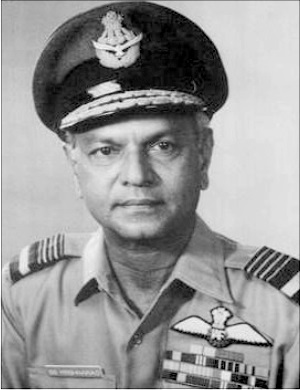 Air Vice Marshal Bandi Sreeramulu Krishnarao was commissioned in the Indian Air Force in October, 1941. Early in his career, he qualified as a flying instructor and subsequently rose to become the Chief Instructor in the principal flying training institution of the Air Force. A large number of pilots serving in the Air Force were trained by him personally or under his supervision. He saw service in a fighter squadron and successfully commanded a Technical Training Unit and a major Air Force flying base. He served with distinction as the Air Attach ear our Embassy in the USSR for nearly three years. Before taking over his appointment as Assistant Chief of Air Staff (Operations), he served as Senior Air Staff Officer of an Operational Command Headquarters for over three years. Under his guidance, the flying potential of the Command and its preparedness to undertake the tasks allotted to it grew considerably. He inspired the staff of the Command Headquarters and the units by his indefatigable efforts, single mindedness in pursuing his objectives, and his devotion to duty. Throughout, Air Vice Marshal Krishnarao has rendered distinguished service of an exceptional order. | ||||
| Reference: | Gazette of India Notification Dated : 26 Jan 1972 Number: | ||||
| AVM | Amolak Singh Rikhy 2024 AEL | Unit : HAL | Award Date 26 Jan 72 | Announced 26 Jan 72 | |
| Details : | 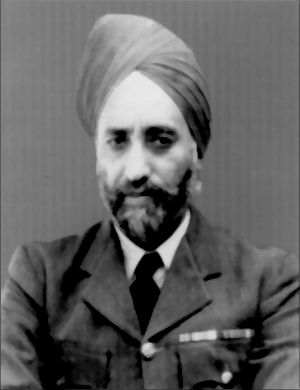 Air Vice Marshal Amolak Singh Rikhy (2024) was commissioned in the Engineering Branch of the Indian Air Force in 1943. During his service, he has held many important field and staff appointments with distinction. Since 1954 he has served almost continuously on deputation with Hindustan Aeronautics Ltd., first as General Manager of the Kanpur Division, then briefly as Managing Director of the Nasik, Hyderabad and Koraput Divisions, and from early 1969, as Managing Director of the Bangalore Division. When Air Vice Marshal Rikhy first joined HAL, the Kanpur Division was in a state of flux as a consequence of its transfer from the Air Force to Company management. AVM Rikhy dealt with its many administrative and technical problems with patience, perseverance and deep understanding. Working conditions and technical practices were greatly improved and there was a four fold increase in production. The Bangalore Division of HAL has now been under AVM Rikhy's care fro nearly three years. This is the oldest and largest Division of HAL, manufacturing six types of aircraft and three types of engines. Here again, during the period of his stewardship. AVM Rikhy has greatly strengthened the administration and working of aircraft and engine factories. Wherever he has served, both in the Air Force and in HAL; AVM Rikhy has won the confidence of his colleagues and workers. His high professional knowledge and outstanding ability as an Engineer and a Manager have contributed much to the efficiency of the Air Force and the aircraft industry. He has rendered exceptional service of the most exceptional order. | ||||
| Reference: | Gazette of India Notification Dated : 26 Jan 1972 Number: | ||||
| Air Cmde | Chandrashekhar Rao Kurpad 2414 AEL | Unit : HAL | Award Date 26 Jan 72 | Announced 26 Jan 72 | |
| Details : | Air Commodore Chandersekhar Rao Kurpad served in the Technical Signals Branch of the Indian Air Force for 25 years, from 1943 to 1968. During this period he held many staff and field appointments concerned with the training of technical personnel and maintenance of electrical and electronic equipment. In 1965, Air Commodore Kurpad was deputed to Bharat Electronics Ltd., where he was appointed Project Manager with responsibility of progressing the manufacture and supply of vital equipment for the Air Force. In 1964, he was selected to head the planning unit for the electronics factory that was to be set up as part of the MiG-21 project. He was subsequently appointed General Manager of the factory, which became the Hyderabad Division of Hindustan Aeronautics Ltd. He served in that capacity on deputation from the Indian Air Force. In 1969 he was appointed Managing Director of the MiG Complex, made up by the Nasik and Koraput Divisions along with Hyderabad Division . That same year, Air Commodore Kurpad was permitted to retire from the Air Force and take up permanent service with HAL. Throughout his service in the Air Force and on deputation to BEL and HAL, Air Com modore Kurpad has consistently displayed a very high level of professional and managerial ability. He worked quietly, with patience and perseverance, to set up the Air Force's school for electrical and electronic trades. In HAL, his performance as General Manager of the Hyderabad Division and later as Managing Director of the MiG Complex has been outstanding and has contributed a great deal to the success of the MiG project. Air Commodore Chandersekhar Rao Kurpad has thus rendered distinguished service of the most exceptional order. | ||||
| Reference: | Gazette of India Notification Dated : 26 Jan 1972 Number: | ||||
| Air Cmde | Mondan Bhaskaran 2761 AEM | Unit : HAL | Award Date 26 Jan 72 | Announced 26 Jan 72 | |
| Details : | 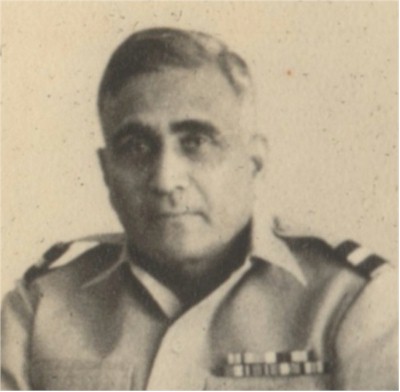 Air Commodore Mohan Bhaskaran joined the Indian Air Force as a technician in January, 1936. In recognition of his abilities, he was commissioned into the Technical Engineering Branch in December, 1943. he retired from the IAF in 1958, when he accepted permanent service with Hindustan Aeronautics Ltd. Air Commodore Bhaskaran has had an outstanding career as an Engineer. During World War II he served as an Engineering Officer with an operational squadron in the North-West Frontier Province and in Burma. The technical knowledge, drive and organizing ability that he brought to his task enabled the squadron to maintain the highest serviceability for its type of aircraft tin the theaters where it operated. After independence, he spent many years in senior engineering appointments at major Air Force flying bases and Repair Depots. During this period, he made very significant contributions to improving the maintenance organisation of the Air Force. In 1963 Air Commodore Bhaskaran was placed in-charge of a project team for the setting up of an airframe factory for the manufacture of the MiG-21 aircraft in India. In the following years, he was appointed General Manager of the Factory, which became the Nasik Division of Hindustan Aeronautics Ltd. He continues to be in that appointment to this day. Manufacture of sophisticated aircraft such as the MiG-21 calls for technical and managerial ability of the highest order. Air Commodore Bhaskaran has displayed these qualities in ample measure. Construction of the airframe factory began in 1964, and the first aircraft was delivered from it two years later, in 1966. In the intervening period, Air Commodore Bhaskaran trained his workmen, erected the manufacturing plant and initiated the assembly and testing of aircraft more or less simultaneously. Thereafter, he has consistently fulfilled the manufacture programme despite many difficulties inherent in a sophisticated project of this type. Credit for this is due to Air Commodore Bhaskaran's untiring efforts and unremitting zeal. Air Commodore Bhaskaran has thus rendered distinguished service of the most exceptional order. | ||||
| Reference: | Gazette of India Notification Dated : 26 Jan 1972 Number: | ||||
| Wg Cdr | Cecil Vivian Parker 4346 F(P) | Unit : No.20 Squadron | Award Date 04 Dec 71 | Announced 26 Jan 72 | |
| Details : | 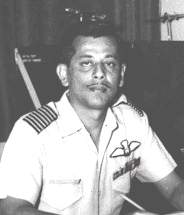 Wing Commander Parker. the Officer Commanding to a fighter bomber squadron [No.20 Squadron, Hunters] led many deep penetration missions into enemy held territory attacking strongly defended targets. While returning from one such mission, his formation was attacked by enemy Sabre aircraft In the ensuing tight. Wing Commander Parker shot down one Sabre and heavily damaged another. In another mission, he attacked the enemy oil refinery at Attock, in the face of the most intense anti-aircraft and small arms tire. seriously damaging the refinery. In all his missions, the actions of Wing Commander Parker have been marked by great courage and determination, and he has been a shining example to the other pilots under his command. His leadership both in peace and war has been outstanding. He has displayed devotion to duty, bravery in the face of heavy enemy opposition and courage in leading many missions day after day. Wing Commander Parker. the Officer Commanding to a fighter bomber squadron [No.20 Squadron, Hunters] led many deep penetration missions into enemy held territory attacking strongly defended targets. While returning from one such mission, his formation was attacked by enemy Sabre aircraft In the ensuing tight. Wing Commander Parker shot down one Sabre and heavily damaged another. In another mission, he attacked the enemy oil refinery at Attock, in the face of the most intense anti-aircraft and small arms tire. seriously damaging the refinery. In all his missions, the actions of Wing Commander Parker have been marked by great courage and determination, and he has been a shining example to the other pilots under his command. His leadership both in peace and war has been outstanding. He has displayed devotion to duty, bravery in the face of heavy enemy opposition and courage in leading many missions day after day. | ||||
| Reference: | Gazette of India , 12th February 1972 - No.20 - Pres/72 dated 20th January 1972 | ||||
| Sqn Ldr | Ravinder Nath Bharadwaj 5001 F(P) | Unit : No.20 Squadron | Award Date 05 Dec 71 | Announced 26 Jan 72 | |
| Details : | 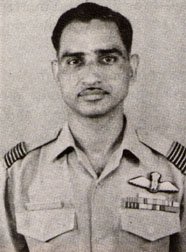 Squadron Leader Bhardwaj, a senior pilot in a fighter-bomber squadron [No.20 Squadron, Hunters] , has led a number of operational missions against a variety of enemy targets. On December 5, 1971, he led a raid on an enemy airfield. Although the target was heavily defended by anti-aircraft and small arms fire, he pressed home the attack. He himself set fire to an enemy heavy transport aircraft in one of his attacks, and eventually led his mission safely back to base. On December 7, 1971 , he led another mission this time to heavily defended power station. Here too, his mission succeeded in causing heavy damage, without any loss to our aircraft. On December 10, 1971, he led a close support mission to the Chhamb area. During the first attack, his aircraft as well as that of his number two were hit by ground fire, and as they pulled out of the attacks they were engaged by enemy Sabres. He guided his number two out of danger, and then returned to the fray shooting down a Sabre which crashed inside our lines near the Chhamb bridge. By this time he was alone, but he returned to the attack, against Pakistani tanks and troops, and caused extensive damage to these targets before nursing his damaged aircraft back to base, where he landed safely. He has displayed exceptional gallantry, leadership and bravery in the face of heavy odds, which are in the highest traditions of the Air Force. Squadron Leader Bhardwaj, a senior pilot in a fighter-bomber squadron [No.20 Squadron, Hunters] , has led a number of operational missions against a variety of enemy targets. On December 5, 1971, he led a raid on an enemy airfield. Although the target was heavily defended by anti-aircraft and small arms fire, he pressed home the attack. He himself set fire to an enemy heavy transport aircraft in one of his attacks, and eventually led his mission safely back to base. On December 7, 1971 , he led another mission this time to heavily defended power station. Here too, his mission succeeded in causing heavy damage, without any loss to our aircraft. On December 10, 1971, he led a close support mission to the Chhamb area. During the first attack, his aircraft as well as that of his number two were hit by ground fire, and as they pulled out of the attacks they were engaged by enemy Sabres. He guided his number two out of danger, and then returned to the fray shooting down a Sabre which crashed inside our lines near the Chhamb bridge. By this time he was alone, but he returned to the attack, against Pakistani tanks and troops, and caused extensive damage to these targets before nursing his damaged aircraft back to base, where he landed safely. He has displayed exceptional gallantry, leadership and bravery in the face of heavy odds, which are in the highest traditions of the Air Force. | ||||
| Reference: | Gazette of India , 12th February 1972 - No.20 - Pres/72 dated 20th January 1972 | ||||
| Wg Cdr | Padmanabha Gautam 4482 F(P) | Unit : No.16 Squadron | Award Date 05 Dec 71 | Announced 26 Jan 72 | |
| Details : | 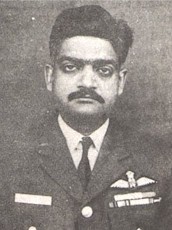 Wing Commander Padmanabha Gautam, MVC; VM, Commanding Officer of a bomber squadron [No.16 Squadron, Canberras] led many missions deep into enemy territory. Notable among these are two raids on the night of December 5th and 7th, 1971,when he led attacks on Mianwali airfield. On both these occasions he and his formation were met with intense anti-aircraft fire. Despite that, the target was attacked with great precision, at low level, and heavy damage was inflicted. On other missions, Wg Cdr Gautam carried out rocket and four gun attacks on railway marshalling yards in the Montgomery-Raiwind area with conspicuous success. Through out the period of operations, Wg Cdr Gautam displayed an ability for cool and clear planning, along with unflinching courage, exemplar flying skill and leadership of the highest order in carrying out many hazardous missions. His conduct has been in the finest tradition of the Air Force. Wing Commander Padmanabha Gautam, MVC; VM, Commanding Officer of a bomber squadron [No.16 Squadron, Canberras] led many missions deep into enemy territory. Notable among these are two raids on the night of December 5th and 7th, 1971,when he led attacks on Mianwali airfield. On both these occasions he and his formation were met with intense anti-aircraft fire. Despite that, the target was attacked with great precision, at low level, and heavy damage was inflicted. On other missions, Wg Cdr Gautam carried out rocket and four gun attacks on railway marshalling yards in the Montgomery-Raiwind area with conspicuous success. Through out the period of operations, Wg Cdr Gautam displayed an ability for cool and clear planning, along with unflinching courage, exemplar flying skill and leadership of the highest order in carrying out many hazardous missions. His conduct has been in the finest tradition of the Air Force. | ||||
| Reference: | Gazette of India , 12th February 1972 - No.22 - Pres/72 dated 20th January 1972 | ||||
| Wg Cdr | Man Mohan Bir Singh Talwar 4573 F(P) | Unit : No.5 Squadron | Award Date 17 Dec 71 | Announced 26 Jan 72 | |
| Details : | 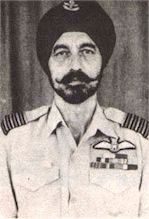 Wing Commander Talwar, Commanding Officer of a Bomber Squadron [No.5 Squadron, Canberras] led five day and night bombing missions against very heavily defended enemy targets within the first 10 days of operations. On one of these missions, he inflicted very severe damage to the Pakistani Air Force installations at Sargodha. In a daylight mission in the Chhamb area, in support of the army, he attacked four enemy gun positions near the Munnawar Tawi river and effectively silenced three of them facilitating the advance of our troops in difficult terrain. Both these targets were heavily defended ; the latter was close to an enemy fighter base from where interception was also likely. Despite this, the officer pressed home his attacks with great determination and much success. His conduct was an inspiration to the crews of the other aircraft which he was leading. The bold leadership, tenacity of purpose, flying skill and bravery displayed by Wing Commander Talwar were largely responsible for the many successes of his squadron. Wing Commander Talwar, Commanding Officer of a Bomber Squadron [No.5 Squadron, Canberras] led five day and night bombing missions against very heavily defended enemy targets within the first 10 days of operations. On one of these missions, he inflicted very severe damage to the Pakistani Air Force installations at Sargodha. In a daylight mission in the Chhamb area, in support of the army, he attacked four enemy gun positions near the Munnawar Tawi river and effectively silenced three of them facilitating the advance of our troops in difficult terrain. Both these targets were heavily defended ; the latter was close to an enemy fighter base from where interception was also likely. Despite this, the officer pressed home his attacks with great determination and much success. His conduct was an inspiration to the crews of the other aircraft which he was leading. The bold leadership, tenacity of purpose, flying skill and bravery displayed by Wing Commander Talwar were largely responsible for the many successes of his squadron. | ||||
| Reference: | Gazette of India , 12th February 1972 - No.20 - Pres/72 dated 20th January 1972 | ||||
| Wg Cdr | Allan Albert D'Costa 4580 F(P) | Unit : No.222 Squadron | Award Date 04 Dec 71 | Announced 26 Jan 72 | |
| Details : | 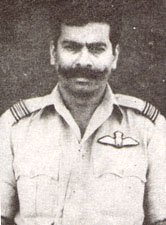 Wing Commander A.A.D'Costa, the Commanding Officer of a Fighter-Bomber squadron [No.222 Squadron, Sukhoi-7], had brought his squadron up to the highest pitch of operational preparedness. His foresight and leadership paid excellent dividends during the war, as he and the Squadron achieved outstanding results. During the war, the officer led no fewer than 15 missions deep into enemy territory against heavily defended targets, thus setting a fine example to his pilots. On December 4,1971 he was the first to strike at the enemy's Risalwala airfield. On the same day he followed up by attacking Chander airfield. On the next day, he led a mission to Chistian Mandi, where he personally accounted for three enemy tanks, as confirmed by films brought back by him. On December 6 he led an attack on a concentration of tanks at Dera Baba Nanak, in the face of the most intense anti-aircraft fire. Although his No. 2 was shot down by this ground fire. he pressed home the attack, with utter disregard for his own safety, destroying a number of tanks and damaging others. On December 7 he carried out a low level photographic reconnaissance mission, in the Sulemanki area and followed this up by leading an attack on the same day, on the railway station at Norowal, where he personally destroyed and damaged many railway wagons, as well as some installations. From December 8 to 12 he flew a number of unescorted reconnaissance missions, bringing back a large volume of intelligence based on which air and ground operations were conducted. Thereafter, up to the end of the fighting, he led missions mainly against railway targets, including the marshalling yards at Raiwind, the Kasur-Lahore railway tracks, destroying a large number of wagons and causing devastation at each target. His constant example of bravery, determination and skill were an inspiration to the pilots of his squadron. Wing Commander A.A.D'Costa, the Commanding Officer of a Fighter-Bomber squadron [No.222 Squadron, Sukhoi-7], had brought his squadron up to the highest pitch of operational preparedness. His foresight and leadership paid excellent dividends during the war, as he and the Squadron achieved outstanding results. During the war, the officer led no fewer than 15 missions deep into enemy territory against heavily defended targets, thus setting a fine example to his pilots. On December 4,1971 he was the first to strike at the enemy's Risalwala airfield. On the same day he followed up by attacking Chander airfield. On the next day, he led a mission to Chistian Mandi, where he personally accounted for three enemy tanks, as confirmed by films brought back by him. On December 6 he led an attack on a concentration of tanks at Dera Baba Nanak, in the face of the most intense anti-aircraft fire. Although his No. 2 was shot down by this ground fire. he pressed home the attack, with utter disregard for his own safety, destroying a number of tanks and damaging others. On December 7 he carried out a low level photographic reconnaissance mission, in the Sulemanki area and followed this up by leading an attack on the same day, on the railway station at Norowal, where he personally destroyed and damaged many railway wagons, as well as some installations. From December 8 to 12 he flew a number of unescorted reconnaissance missions, bringing back a large volume of intelligence based on which air and ground operations were conducted. Thereafter, up to the end of the fighting, he led missions mainly against railway targets, including the marshalling yards at Raiwind, the Kasur-Lahore railway tracks, destroying a large number of wagons and causing devastation at each target. His constant example of bravery, determination and skill were an inspiration to the pilots of his squadron. | ||||
| Reference: | Gazette of India , 12th February 1972 - No.20 - Pres/72 dated 20th January 1972 | ||||
| Wg Cdr | Swaroop Krishna Kaul 4721 F(P) | Unit : No.37 Squadron | Award Date 04 Dec 71 | Announced 26 Jan 72 | |
| Details : | 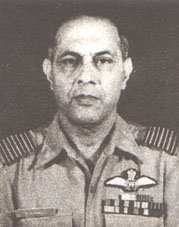 At the outbreak of hostilities, Wing Commander S K Kaul, the Commanding Officer of a Fighter Bomber Squadron [No.37 Squadron, Hunters], volunteered for an urgent task to photograph certain areas in Bangla Desh. These photographs were badly needed in order to finalise our Army’s assault plans. The officer carried out four missions deep into enemy territories ot cover the heavily defended sectors of Comila, Sylhet and Saidapur. At times, he had to fly as low as 200 feet over the most heavily defended enemy locations. Undaunted, he flew through these barrages, making repeated runs in each of his missions and successfully completed the task. On 4th December 1971, he again volunteered for another task to photograph the Tezgaon and Kurmitola airfields. His reconnaissance flights over these two airfields, in the face of the most sustained and heavy enemy ground fire stood out as acts of heroism, extreme gallantry and devotion to duty. In addition to his reconnaissance exploits, he led the very first eight aircraft strike mission over Dacca. In this raid, his formation encountered four enemy aircraft near the target area. With exemplary leadership, he manoeuvred his forces in such a manner that two of the enemy aircraft could be shot down and the other two fled. The target thus became clear for attack. Throughout the period of operations, Wing Commander Kaul led his squadron boldly, with tenacity and personally displayed courage of an exceptionally high order in the face of the enemy At the outbreak of hostilities, Wing Commander S K Kaul, the Commanding Officer of a Fighter Bomber Squadron [No.37 Squadron, Hunters], volunteered for an urgent task to photograph certain areas in Bangla Desh. These photographs were badly needed in order to finalise our Army’s assault plans. The officer carried out four missions deep into enemy territories ot cover the heavily defended sectors of Comila, Sylhet and Saidapur. At times, he had to fly as low as 200 feet over the most heavily defended enemy locations. Undaunted, he flew through these barrages, making repeated runs in each of his missions and successfully completed the task. On 4th December 1971, he again volunteered for another task to photograph the Tezgaon and Kurmitola airfields. His reconnaissance flights over these two airfields, in the face of the most sustained and heavy enemy ground fire stood out as acts of heroism, extreme gallantry and devotion to duty. In addition to his reconnaissance exploits, he led the very first eight aircraft strike mission over Dacca. In this raid, his formation encountered four enemy aircraft near the target area. With exemplary leadership, he manoeuvred his forces in such a manner that two of the enemy aircraft could be shot down and the other two fled. The target thus became clear for attack. Throughout the period of operations, Wing Commander Kaul led his squadron boldly, with tenacity and personally displayed courage of an exceptionally high order in the face of the enemy | ||||
| Reference: | Gazette of India , 12th February 1972 - No.20 - Pres/72 dated 20th January 1972 | ||||
| Gp Capt | Chandan Singh 3460 F(P) | Unit : 10 Wing | Award Date 07 Dec 71 | Announced 26 Jan 72 | |
| Details : | 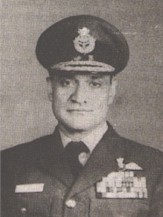 Group Captain Chandan Singh, AVSM. VRC is the officer commanding of an Air Force Station in the East [Air Force Station, Jorhat]. During the war with Pakistan, he was in the forefront of the air operations conducted for the liberation of Bangla Desh. Group Captain Chandan Singh was also responsible for the planning and execution of the special helicopter operations to airlift two companies of troops of the Sylhet area. When it became necessary to overcome the obstacles in the advance of the army towards Dacca, he planned and executed the move of nearly 3,000 troops and 40 tons of equipment and heavy guns with the extremely limited helicopter force at his disposal. This operation entailed landing the troops and equipment near heavily defended areas by night. Prior to each mission he personally carried out reconnaissance in the face of heavy enemy fire. On the night of December 7/8 he flew eight missions, deep into enemy territory to supervise the progress of the helicopter airlift and to guide and inspire his pilots who were facing heavy opposition from ground tire. Later he undertook a further 18 missions in the same operation, always leading the landings at new places. On many occasions his helicopter was hit by ground fire, but this did not deter him from further missions. The success of this major airborne operation contributed significantly to the fall of Dacca and the capitulation of tie Pakistan armed forces, in Bangla Desh. The leadership, drive and determination coupled with the bravery shown by Group Captain Chandan Singh over an extended .period of time, are in the highest traditions of the Air Force. Group Captain Chandan Singh, AVSM. VRC is the officer commanding of an Air Force Station in the East [Air Force Station, Jorhat]. During the war with Pakistan, he was in the forefront of the air operations conducted for the liberation of Bangla Desh. Group Captain Chandan Singh was also responsible for the planning and execution of the special helicopter operations to airlift two companies of troops of the Sylhet area. When it became necessary to overcome the obstacles in the advance of the army towards Dacca, he planned and executed the move of nearly 3,000 troops and 40 tons of equipment and heavy guns with the extremely limited helicopter force at his disposal. This operation entailed landing the troops and equipment near heavily defended areas by night. Prior to each mission he personally carried out reconnaissance in the face of heavy enemy fire. On the night of December 7/8 he flew eight missions, deep into enemy territory to supervise the progress of the helicopter airlift and to guide and inspire his pilots who were facing heavy opposition from ground tire. Later he undertook a further 18 missions in the same operation, always leading the landings at new places. On many occasions his helicopter was hit by ground fire, but this did not deter him from further missions. The success of this major airborne operation contributed significantly to the fall of Dacca and the capitulation of tie Pakistan armed forces, in Bangla Desh. The leadership, drive and determination coupled with the bravery shown by Group Captain Chandan Singh over an extended .period of time, are in the highest traditions of the Air Force. | ||||
| Reference: | Gazette of India , 12th February 1972 - No.20 - Pres/72 dated 20th January 1972 | ||||
| Flt Lt | Kuldip Kumar Sharma 7584 MET | Unit : -N.A.- | Award Date 17 May 70 | Announced 26 Jan 72 | |
| Details : | 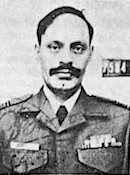 On the 17th May 1970, at one of the forward airfields, a major grass fire broke out covering a large area around the Bomb Dump. Flight Lieutenant Kuldeep Kumar Sharma was the first officer to arrive at the spot and to lead the fire crew trying to control it. With the help from the small fire crew, he bravely fought the fire till more men arrived. Due to wind, the grass inside the Bomb Dump, the empty crates and the tarpaulins covering the High Explosive Bombs caught fire. Undeterred he kept on fighting the fire even when some stores began exploding. Throughout, Flight Lieutenant Kuldeep Kumar Sharma displayed conspicuous gallantry and determination of a very high order. | ||||
| Reference: | Gazette of India , ??th August 1972 - No.93 - Pres/72 dated 26th January 1972 | ||||
| Flt Sgt | Moj Prakash Puri 34629 OR | Unit : -N.A.- | Award Date 17 May 70 | Announced 26 Jan 72 | |
| Details : | 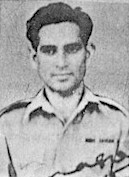 On 17th May 1970, a major grass fire broke out at a forward Air Force base covering a very large area around the Mechanical Transport Section and the Bomb Dump. Due to wind the fire spread into the Bomb Dump and the tarpaulins covering high explosive bombs and the grass around the building caught fire. Flight Sergeant MOJ Parkash Puri, as Senior Non commissioned Officer-in-Charge of the fire Section, gave an excellent account of himself and guided the fire crew throughout the fire fighting operations, in a cool and systematic manner. Regardless of his personal safety, he remained on the spot even when some of the stores began to explode. In this action, Flight Sergeant MOJ Parkash Puri displayed conspicuous gallantry, determination and devotion to duty of a very high order. | ||||
| Reference: | Gazette of India , ??th August 1972 - No.93 - Pres/72 dated 26th January 1972 | ||||
| Air Cmde | Gian Dev Sharma 1742 F(P) | Unit : -N.A.- | Award Date 26 Jan 72 | Announced 26 Jan 72 | |
| Details : | 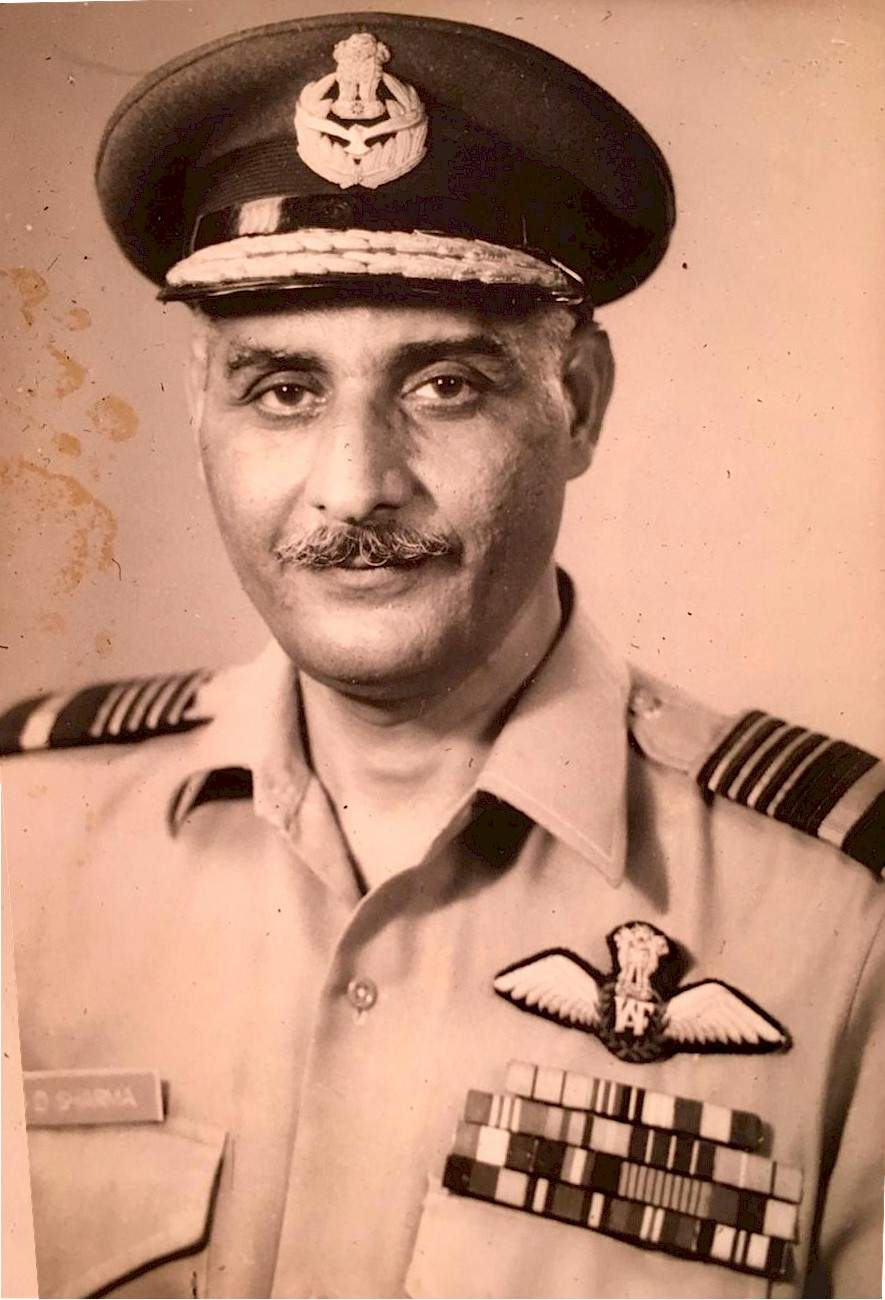 Air Commodore Gian Dev Sharma (1742) was commissioned in Flying (Pilot) of the Indian Air Force in November 1941. During his long service, he has held a variety of important flying and staff appointments. In all these appointments, he has left a mark of his personal efficiency and devotion to service. At present, he is holding the appointment of Director of Operations (Transport and Maritime) at Air Headquarters. In his present appointment, Air Commodore Sharma is responsible for planning and executing the transport and maritime operations in the IAF. In the recent conflict with Pakistan, he was called upon to plan the entire transport operations including the historic airborne operations in the Eastern Sector. Maritime operational plans had also been drawn up for the efficient conduct of the war. All this had to be done with speed and determination. Air Commodore Sharma worked with zeal and selfless devotion to duty, with complete disregard for personal comforts, and organized the transport and maritime operations so effectively that the true strength and the power of the Indian Air Force could be felt in battle. Air Commodore Gian Dev Sharma has thus rendered distinguished service of the most exceptional order. | ||||
| Reference: | Gazette of India Notification Dated : 26 Jan 1972 Number: | ||||
| Air Cmde | Bawa Sampuram Singh Bedi 1795 AEM | Unit : -N.A.- | Award Date 26 Jan 72 | Announced 26 Jan 72 | |
| Details : | 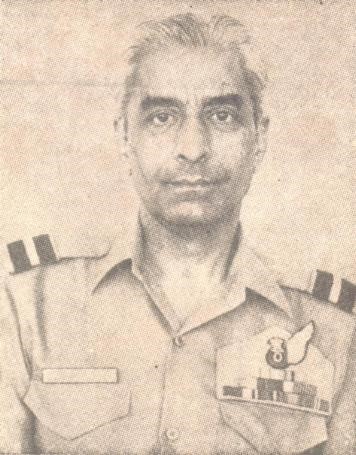 Air Commodore Bawa Sampuran Singh Bedi was commissioned in the erstwhile Technical Armament Branch of the Indian Air Force in January, 1942. He served with aÂnumber of operational wings, stations and explosives storage units before being taken on to the staff of a Command Headquarters and at Air Headquarters. He has served as the Deputy Director of Studies (Air) at the Institute of Armament Studies and with the Department of Defence production. He also served as the Chief Inspector of Maintenance and Director of Engineering at Air Headquarters. He is at present working as the Senior Maintenance Staff Officer at Headquarters Central Air Command. He had to face numerous problems arising out of the reÂorganisation of the Command. As the Senior Maintenance Staff Officer he was responsible for bringing about the technical coÂordination necessary for the maintenance of the formations and units in the Command. He accomplished the task of improving the serviceability of all the aircraft types in the Command, thereby enabling the achievement of squadron tasks. The successes achieved by fighter, bomber, transport and maritime reconnaissance squadrons of the Command are, in no small measure, due to his careful planning and provisioning of technical and logistic support to them. Throughout his career, and especially in the recent conflict with Pakistan, Air Commodore Bawa Sampuran Singh Bedi ably handled all the assignments given to him. He has rendered distinguished service of an exceptional order. | ||||
| Reference: | Gazette of India Notification Dated : 26 Jan 1972 Number: | ||||
| Air Cmde | Arjun Singh M Bhawnani 1868 F(P) | Unit : -N.A.- | Award Date 26 Jan 72 | Announced 26 Jan 72 | |
| Details : | 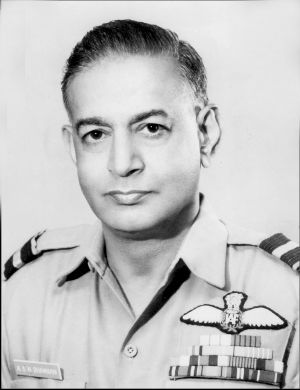 Air Commodore Arjan Singh Mangharam Bhawnani (1868) was commissioned as a pilot in the Flying Branch of the Indian Air Force in April 1942. He served with distinction as Chief of Fighter Operations in the Congo from August 1961 to August 1962 and subsequently commanded an operational station in the Eastern Sector. He was commended by the Chief of the Air Staff for his work during the Chinese aggression. Later, Air Commodore Bhawnani commanded a Tactical Air Centre, a Jet Training Wing and an Air Defence Area Headquarters. Air Commodore Bhawnani is at present the Senior Air and Administrative Staff Officer at a Command Headquarters. During his tenure, a major reorganization of the Command took place which necessitated the closing down of a number of units and the forming of new units. Stock transfers of considerable magnitude had to be completed without disrupting supply. The Command was faced with many administrative, accounting and personnel problems. These problems were further accentuated by the geographical vastness of the Command with units located in all parts of the country. With painstaking effort, initiative and exceptional devotion to duty, Air Commodore Bhawnani has successfully tackled these complex tasks. Air Commodore Arjan Singh Mangharam Bhawnani has thus rendered distinguished service of an exceptional order. | ||||
| Reference: | Gazette of India Notification Dated : 26 Jan 1972 Number: | ||||
| Air Cmde | Solomon Purushottam 1928 F(P) | Unit : -N.A.- | Award Date 26 Jan 72 | Announced 26 Jan 72 | |
| Details : | 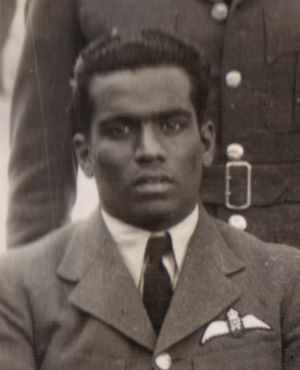 Air Commodore Solomon Purshotham was commissioned in the Flying (Pilot) of the Indian Air Force in June, 1942. During his long service, he has held a variety of important flying and staff appointments. Air Commodore Purshotham was responzsible for the peace time training of forces under his command. In December, 1971, at the time of Indo-Pakistan conflict, he was the Air Officer Commanding Eastern Air Command Advanced Headquarters, which operates alongside the Headquarters Eastern Army Command. He was this responsible for joint planning and execution of ArmyAir operations in the Eastern Sector. Under his leadership, good rapport was established between the Army and the Air Force. The support provided by the Air Force effectively disrupted the enemy's lines of communications, isolating his forward troops. Enemy ammunition and fuel dumps were also blown up and many of his Headquarters locations were destroyed. Air Commodore Solomon Purshotham made a significant contribution toward the final victory of our forces in Bangla Desh. | ||||
| Reference: | Gazette of India Notification Dated : 26 Jan 1972 Number: | ||||
| Air Cmde | Harcharan Singh Bakshi 2083 ADM | Unit : -N.A.- | Award Date 26 Jan 72 | Announced 26 Jan 72 | |
| Details : | 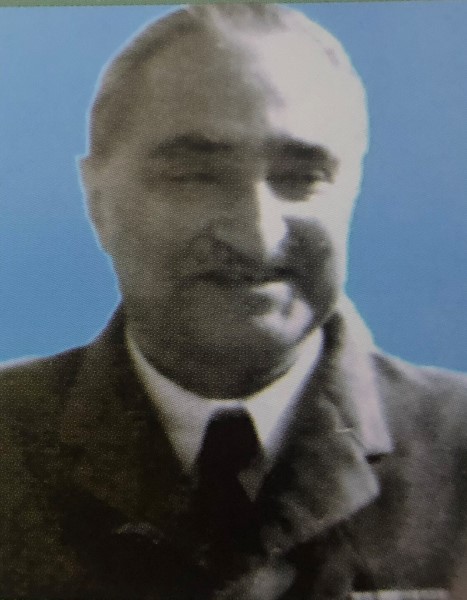 Air Commodore Harcharan Singh Bakshi was commissioned in the Administrative Branch of the Air Force in October, 1942. He saw active service during the Second World War in Ceylon and Burma and has held with distinction many Staff appointments connected with personnel as well as general administration. During the recent conflict with Pakistan he was Director of Air Force Works at Air Headquarters in which capacity he was responsible for providing adequate defence works for protection of aircraft and vital installations, for ensuring uninterrupted power supply for operational installations and for setting up of emergency repair organisations at forward airfields. A number of second tier airfields had also to be developed for operational use at short notice, which necessitated provision of works services such as power supply, blast pens and bulk petrol installations. By his timely rearrangement of priorities in the Works Plan, it was possible for all these operational tasks to be accomplished in time. The organisation set up for the emergency repair of airfields functioned smoothly at all forward Wings and the airfields remained operational throughput the hostilities despite persistent attacks on them by the enemy. He kept himself informed of the damage done by enemy attacks to airfields and ensured timely augmentation of resources, wherever necessary. Throughout the operations, Air Commodore Harcharan Singh Bakshi rendered distinguished service of an exceptional order. | ||||
| Reference: | Gazette of India Notification Dated : 26 Jan 1972 Number: | ||||
| Air Cmde | Gorindra Kumar Singha 2361 AEM | Unit : -N.A.- | Award Date 26 Jan 72 | Announced 26 Jan 72 | |
| Details : | 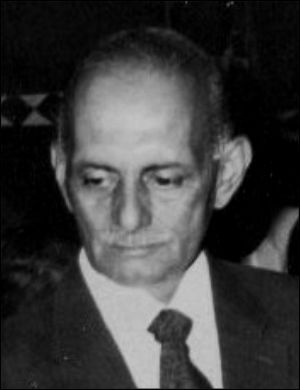 Air Commodore Corindra Kumar Singha was commissioned in the Indian Air Force. He has served in several operational units and at Command and Air Headquarters. He was the Director of Armament and Safety Equipment at Air Headquarters for a long period before he retired from the Air Force in July 71. He was subsequently recalled to active duty. As Director of Armament and Safety Equipment he undertook the task of developing and modifying the available weapons systems in aircraft of diverse origins in order to improve their striking power and made significant contribution in this sphere. After being recalled, Air Commodore Corindra Kumar Singha was assigned certain special duties to which he applied himself with untiring zeal. He made a significant contribution to further increasing the offensive potential of the Air Force. With his high professional skill, zeal and devotion to duty, Air Commodore Corindra Kumar Singha has rendered distinguished service of an exceptional order. | ||||
| Reference: | Gazette of India Notification Dated : 26 Jan 1972 Number: | ||||
| Air Cmde | Kanwar Singh 2781 F(P) | Unit : Western Air Command | Award Date 26 Jan 72 | Announced 26 Jan 72 | |
| Details : | 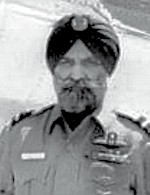 Air Commodore Kanvar Singh was commissioned in the Flying Branch of the Indian Air Force on the 20th December, 1943. He has served in five fighter and fighter bomber squadrons of the Indian Air Force, of which he has been the commander of two. He is also a qualified flying instructor and has carried out a tenure of duty in this role at an Air Force Flying Training Institution. Air Commodore Kanvar Singh has also commanded an operational wing of the Air Force and has served on the staff of Air Headquarters in various capacities. At present Air Commodore Kanvar Singh is the Air Officer Commanding of an Air Wing in the Rajasthan sector. He was incharge of all Air Force operations in this during the recent operations against Pakistan. He provided all the air support required by the Army. In addition to his own base, he exercised administrative and functional control over two forward bases. By hard work and sound planning, he brought these forward bases to a high degree of operational preparedness. Throughout the operations, Air Commodore Kanvar Singh successfully completed all the tasks allotted to him and rendered distinguished service of an exceptional order. | ||||
| Reference: | Gazette of India Notification Dated : 26 Jan 1972 Number: | ||||
| Air Cmde | Trilochan Singh Brar 2884 F(P) | Unit : Western Air Command | Award Date 26 Jan 72 | Announced 26 Jan 72 | |
| Details : | 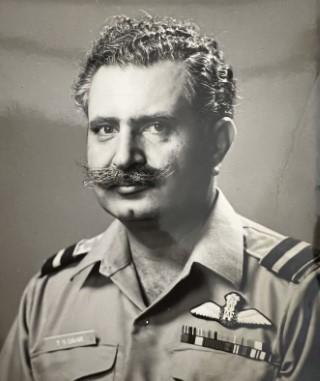 Air Commodore Trilochan Singh Brar was commissioned in the Flying (Pilot) of the Indian Air Force in April, 1944. He has held a variety of important flying and staff appointments. Since November, 1970, he has been holding the appointment of AirÂI of Headquarters Western Air Command. The Command was required to prepare plans to meet the threat from Pakistan. The preparation of the plan required careful study and prolonged hours of work to ensure that the resources of the Command were utilised in an economical and effective manner. Air Commodore Trilochan Singh Brar made significant contribution towards the success of Western Air Command's plans during the recent conflict with Pakistan. He has rendered distinguished service of an exceptional order. | ||||
| Reference: | Gazette of India Notification Dated : 26 Jan 1972 Number: | ||||
| Air Cmde | John Jasper Bouche 2938 F(P) | Unit : -N.A.- | Award Date 26 Jan 72 | Announced 26 Jan 72 | |
| Details : | 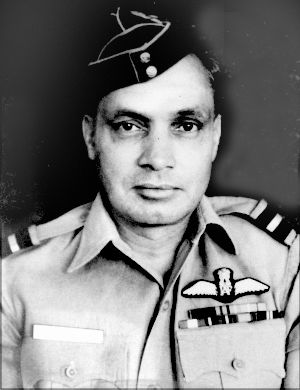 Group Captain John Jasper Bouche (2938) was commissioned in the Indian Air Force in June, 1943, in the General Duties (Pilot) Branch. During the Second World War, he served in a fighter Squadron, trained as a Pilot Attack Instructor, completed a full tenure at the Armament Training Wing, Air Force, as its Chief Instructor and was responsible for the operational training, standardization and enhancement of combat efficiency of all operational squadrons of the Air Force during that period. Although an officer of the General Duties Branch, he was specially selected to undergo a full term Technical Course at the Air Force Technical College, on completion of which he took over Command of the Aircraft and Armament Testing Unit. In this capacity Group Captain Bouche was personally responsible for the development of the Gnat aircraft which was adopted by the Air Force as its main interceptor element. Once he was faced with a grave emergency when the Gnat aircraft that he was flying had a hydraulic failure and went out of control. Having no other alternative the officer had to reluctantly eject. However, the aircraft's seat did not detach itself from his body and after a prolonged and dreadful free fall without an opened parachute, he managed to extricate himself from the seat and just managed to open his parachute in time before he landed on the ground. Group Captain John Jasper Bouche has been in command of an operational wing in the eastern sector which was used as the base for both fighters as well as logistic air support squadrons. Through his personal supervision, zeal and excellent operational knowledge he brought up the operational efficiency of the squadron under his control. On relinquishing his command of the operational wing in the eastern sector he was posted as an Air Staff Officer in Headquarters Eastern Air Command. During this tenure, the Mizo Hill operations started. Although posted as a staff officer in Command Headquarters, this officer personally took control of the operations and remained at the base from where both offensive and transport support operations were being conducted. He set up a new Air Force Station for better coÂordination and operational performance of the Air Force elements deployed against the Mizo hostiles. The results obtained were highly satisfactory. Group Captain John Jasper Bouche has thus rendered distinguished service of an exceptional order. | ||||
| Reference: | Gazette of India Notification Dated : 26 Jan 1972 Number: | ||||
| Air Cmde | Surinder Singh 3009 F(P) | Unit : -N.A.- | Award Date 26 Jan 72 | Announced 26 Jan 72 | |
| Details : | 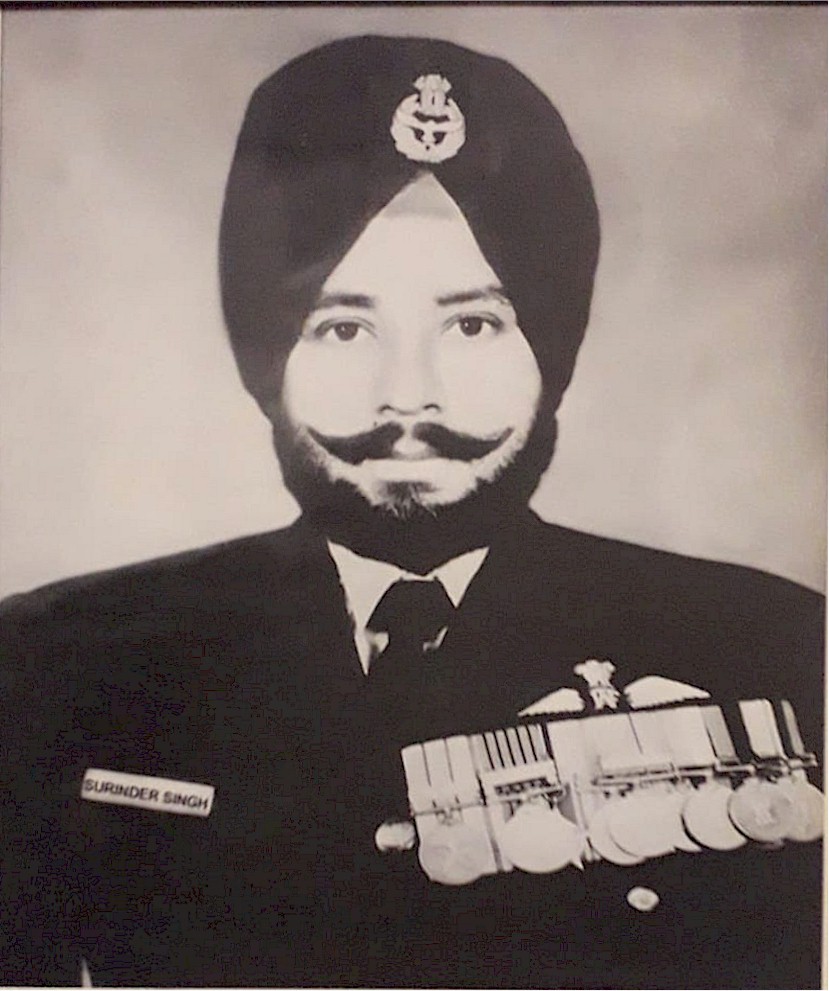 Air Commodore Surinder Singh was commissioned in the Flying Branch of the Indian Air Force in September, 1944. He has served in a number of fighter and fighter bomber squadrons of the Air Force and is a qualified Flying Instructor. Later, he converted on to Jet Bombers and served in two Canberra Squadrons, having also commanded one of them. He has also held various Staff and Command appointments. He is one of the few officers who has commanded more than one operational wing. For his distinguished service, he was awarded Ati Vishisht Seva Medal in January 1966. After attending the Imperial Defence College Course abroad, he came back to India to command an Air Defence Control Centre. He worked with great devotion and determination to improve the Air Defence Organisation in his sector. He visited all the Air Defence units and instilled in them the urgency of getting the entire air defence organisation up to the highest peak of efficiency. He planned and introduced a special low level reporting system in his sector; he trained all the personnel necessary for that organisation and also personally visited every site selected by him for these success of his work both in peace time and during hostilities can be gauged by the with which intruding Pakistani aircraft were intercepted. Air Commodore Surinder Singh has rendered distinguished service of an exceptional order. | ||||
| Reference: | Gazette of India Notification Dated : 26 Jan 1972 Number: | ||||
| Air Cmde | Krishna Mohan Ram 3101 F(P) | Unit : Eastern Air Command | Award Date 26 Jan 72 | Announced 26 Jan 72 | |
| Details : | 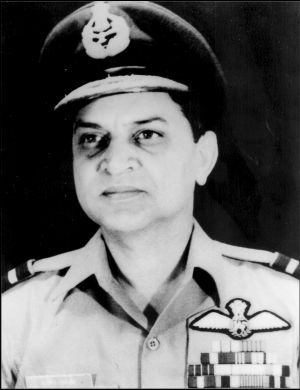 Air Commodore Krishan Mohan Ram was commissioned in the Flying (Pilot) of the Indian Air Force in April, 1945. During his long service, he held a variety of important flying and staff appointment. Since August 1971 he is holding the appointment of Air-I at Headquarters, Eastern Air Command. In this assignment, he was responsible for drawing up the operational plans for the fighter squadrons to meet the Pakistan Air Force threat in Bangla Desh. Simultaneously, he organised intensive training of aircrew in simulated operational conditions to suit the Air Command operational plans. Both these tasks were achieved in a very short period because of his perseverance and hard work. During operations, Air Commodore Krishan Mohan Ram supervised the running of the operations room and assisted in the conduct of the minute to minute operation. He worked tirelessly, for very long hours, displaying excellent administrative skill and professional competence in taking decisions and ordering air strikes in support of the Army and against enemy targets. Amongst his other outstanding achievements during this period were the briefing of the fighter aircrew for pinpoint strike on selected targets as well as the briefing of the bomber aircrew who were assigned tasks in support of the Army. The success of these missions, was to a great extent due to the effective briefing given by Air Commodore Krishan Mohan Ram to the aircrew. Throughout the operation, Air Commodore Krishan Mohan Ram worked without any regard to his personal comforts. His contribution to the success of the operations in the Eastern Sector was significant. He has rendered distinguished service of an exceptional order. | ||||
| Reference: | Gazette of India Notification Dated : 26 Jan 1972 Number: | ||||
| Air Cmde | Jafar Zaheer 3173 F(P) | Unit : AFS Agra | Award Date 26 Jan 72 | Announced 26 Jan 72 | |
| Details : | 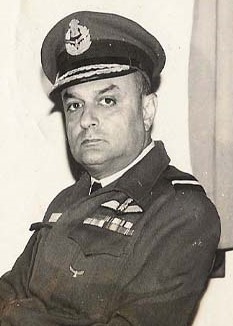 Air Commodore Jafar Zaheer was commissioned in the Air Force in March 1944, in the Flying Branch. He has served with a number of fighter and fighter bomber squadrons of the Air Force and has commanded one of them. In addition, he has been a staff officer at Command and Air Headquarters, the Commander of a Tactical Air Centre and the Air Officer Commanding of an Air Defence Area. At present he is the Air Officer Commanding a major bomber base, and concurrently is the air defence commander of the area within which his base is situated. During the recent conflict with Pakistan, the bombers at his Base carried out a large number of strikes on important targets in enemy territory. Their attacks were kept up throughout the hostilities despite repeated raids by the enemy designed to put the base out of action. The servicing and repair of aircraft and their preparation for operational missions was maintained at a high tempo due largely to the personal example of Air Commodore Jafar Zaheer. He has rendered distinguished service of an exceptional order.
| ||||
| Reference: | Gazette of India Notification Dated : 26 Jan 1972 Number: | ||||
| Air Cmde | Chandrakant Shridhar Naik 3499 AEM | Unit : -N.A.- | Award Date 26 Jan 72 | Announced 26 Jan 72 | |
| Details : | 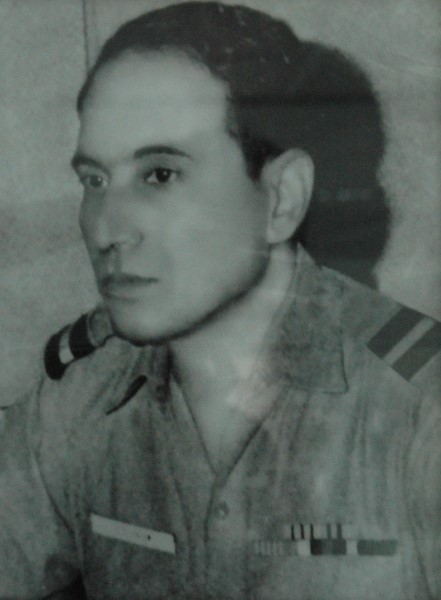 Air Commodore Chandrakant Shridhar Naik was commissioned as an Aircraft Engineer on 16th September, 1947. He has served at a number of operational and training bases as an Engineering Officer and as the Chief Technical Officer of a major Air Force Wing. He has also served in a number of appointments on the maintenance staff of Command Headquarters and Air Headquarters. Recently, he commanded a major Base Repair Depot of the Air Force. At present, Air Commodore Chandrakant Shridhar Naik is the Air Officer Commanding Air Force Station, Kanpur. He has been responsible for improving the functioning of Air Force Station, Kanpur. He has personally supervised the production of aircraft, aeroengines and rotables at two Base Repair Depots. It was largely due to his efforts that both these Depots have shown significant increase in production. In addition to production of aircraft and ancillaries, both these Depots were entrusted with urgent operational tasks which involved development and manufacture of modification sets. These tasks were accomplished in record time. Throughout, Air Commodore Chandrakant Shridhar Naik has rendered distinguished service of an exceptional order. | ||||
| Reference: | Gazette of India Notification Dated : 26 Jan 1972 Number: | ||||
| Air Cmde | Amrit Lal Saigal 3608 AEM | Unit : -N.A.- | Award Date 26 Jan 72 | Announced 26 Jan 72 | |
| Details : | 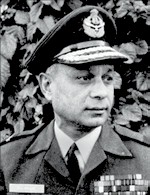 Air Commodore Amrit Lal Saigal, was commissioned in the erstwhile Technical Armament Branch of the Indian Air Force in April, 1949. After serving in a number of units as an Armament Officer, he held appointments on the staff of two Command Headquarters and in an Explosives Storage Unit. He also served as the Senior Maintenance Staff Officer at Headquarters Eastern Air Command and more recently at Air Headquarters. On his appointment as the Senior Maintenance Staff Officer at Headquarters, Western Air Command, Air Commodore Amrit Lal Saigal made a thorough study of the maintenance support required to meet the operational plans of his Command. He identified areas of shortfalls and weaknesses and then devoted himself with untiring energy to make good the shortfalls and remove the weaknesses. He tapped all sources of supply, both within and outside the Air Force and thus enabled the operational units in the Command to achieve and maintain a very high degree of aircraft and equipment serviceability. During the recent conflict with Pakistan, he provided full logistic support to all the operational units even when they were reÂdeployed at short notice. It was due to his foresight and sound planning and execution, that at the end of hostilities, the operational units in his Command had substantially the same degree of aircraft and equipment serviceability as they had at the beginning of hostilities in spite of battle casualties. Throughout, Air Commodore Amrit Lal Saigal has rendered distinguished service of an exceptional order. | ||||
| Reference: | Gazette of India Notification Dated : 26 Jan 1972 Number: | ||||
| Gp Capt | Vivek Yeshvant Nehru 3488 F(N) | Unit : -N.A.- | Award Date 26 Jan 72 | Announced 26 Jan 72 | |
| Details : | 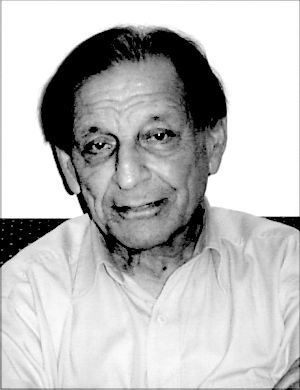 Group Captain Vivek Yeshwant Nehru (3488) was commissioned as a Navigator in the Flying Branch of the Air Force in April, 1948. In the earlier part of his career he served as a navigator in operational squadrons. After successfully completing an Advanced Navigation Course in Australia he was employed as a Navigation Instructor in a training squadron. Subsequently he served as a staff officer in an operational Command. In all these assignments he acquitted himself in an admirable manner. In 1963, Group Captain Vivek Yeshwant Nehru was selected for deputation as an Instructor to the UAR. By his hard work and selfless devotion to duty he earned the gratitude of the UAR Air Force and contributed towards the effectiveness of the IAF Team in that country. In his present assignment as President of an Air Force Selection Board, Group Captain Nehru has brought about a marked improvement in the functioning of the Board as well as in the administration of its various wings. With his dynamic personality and able stewardship it has been possible for the Board to deal with a record number of candidates during 1970. Group Captain Vivek Yeshwant Nehru has thus rendered distinguished service of an exceptional order. | ||||
| Reference: | Gazette of India Notification Dated : 26 Jan 1972 Number: | ||||
| Gp Capt | Kenneth Hubert Larkins 3511 F(P) | Unit : -N.A.- | Award Date 26 Jan 72 | Announced 26 Jan 72 | |
| Details : | 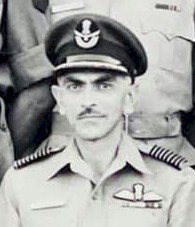 Group Captain Kenneth Hubert Larkins (3511) was commissioned as a pilot in the Flying Branch of the Indian Air Force in September, 1948. During his long and distinguished career he has held a variety of important appointments, including the Command of a Flying Training Unit and a Base Repair Depot. He has also held staff appointments at Air Headquarters. Recently he has completed a tenure as the Staff Officerin charge Administration at an Operational Command Headquarters. In all these appointments, Group Captain Larkins has displayed outstanding ability as an organizer and leader. As the Staff Officer in-charge Administration he geared up the administration of the Command to keep pace with operational requirements. He contributed greatly towards the completion of a number of major works and prompt finalization of pension cases. He showed great acumen and maturity in handling cases of discipline and personnel matters, and in raising the morale of the personnel of the Command. Throughout his career Group Captain Kenneth Hubert Larkins has worked with determination and untiring energy, with tact and understanding, and has achieved outstanding success in the discharge of heavy responsibilities. Group Captain Kenneth Hubert Larkins has thus rendered distinguished service of an exceptional order. | ||||
| Reference: | Gazette of India Notification Dated : 26 Jan 1972 Number: | ||||
| Gp Capt | Karan Dev Singh 2808 EDN | Unit : -N.A.- | Award Date 26 Jan 72 | Announced 26 Jan 72 | |
| Details : | Group Captain Karan Dev Singh (2808) was commissioned in the Education Branch of the Indian Air Force in January, 1944. During his long career, he has held a variety of important appointments, including that of Command Education Officer at an Operational Command Headquarters. After graduating from the Defence Services Staff College and serving at an operational unit, he was posted as Assistant Director, Flight Safety at Air Headquarters. In this capacity, he was responsible for starting the publication of two very popular and instructive Flight Safety periodicals, namely “Flight Guardian" and “Flight Safety Officers' News Letter". These publications have made a significant contribution towards Flight Safety in the IAF. In 1963, Group Captain Singh was selected for appointment as the Principal of the Sainik School, Bijapur (Mysore State). He held this appointment with distinction for six year, bringing credit to the Indian Air Force. He toiled ceaselessly with dedication and initiative to set the school on a sound footing and earned the appreciation of the Mysore State Administration. Group Captain Karan Dev Singh has thus rendered distinguished service of an exceptional order. | ||||
| Reference: | Gazette of India Notification Dated : 26 Jan 1972 Number: | ||||
| Gp Capt | Dukka Venkata Jagan Mohan Rao 5231 DENT | Unit : -N.A.- | Award Date 26 Jan 72 | Announced 26 Jan 72 | |
| Details : | 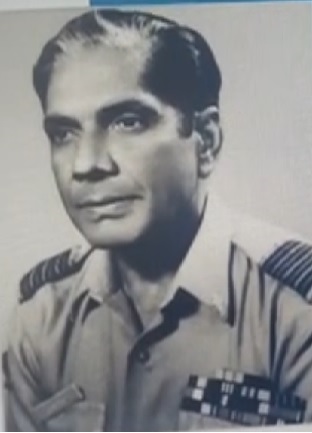 Group Captain Dukkaa Venketa Jagan Mohan Rao (5231) was commissioned in the Army Dental Corps in July 1942. He was the first Dental officer to qualify as a paratrooper and served with the Second Airborne Division. He headed the Para Dental team from 1946 to 1952, and served with the Indian Parachute Field Ambulance both in J&K and Korea. In March 1956, when the Air Force Dental Branch was formed, Group Captain JM Rao was the first Dental Officer to be seconded to the Air Force and he was given the command of the first Air Force Dental Centre. Since then he has rendered outstanding service to the Dental Brach of the Air Force. Group Captain JM Rao has been working on dental problems peculiar to the Air Force, much as Aerodentalgia, early recognition of temproÂmendibular disorders amongst the aircrew of high performance aircraft, air evacuation of maxio-facial cases, fitment of special dentures in relation to accelerative forces and higher incidence of periodontal disturbances among flying personnel. He has published papers on such dental problems in AeroÂMedical Journals and has kept abreast of Aviation Dentistry. He has been mainly responsible for the modernization of the Air Force Dental equipment, ensuring economy in its purchase and maintenance and in setting up the training facilities for dental technicians, dental assistants and dental hygienists. In recognition of his conspicuous services rendered in the Art and Science of Dentistry, the International College of Dentists of the USA has conferred on him the Fellowship of the International College of Dentists. Group Captain Dukkaa Venketa Jagan Mohan Rao has thus rendered distinguished service of exceptional order. | ||||
| Reference: | Gazette of India Notification Dated : 26 Jan 1972 Number: | ||||
| Gp Capt | Gurdial Singh Punia 2134 ADM | Unit : -N.A.- | Award Date 26 Jan 72 | Announced 26 Jan 72 | |
| Details : | 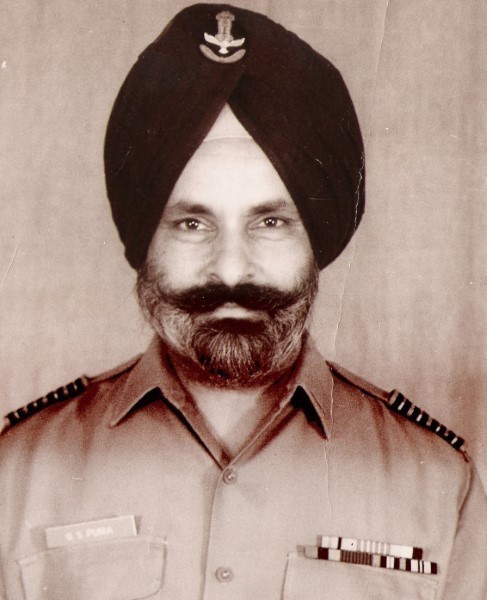 Group Captain Gurdial Singh Punia was commissioned in the Indian Air Force December, 1942, and joined the Administrative Branch on 17th February, 1943. In 29 years in the service, his main role was that of a Link Trainer Instructor. In this c he laid the foundation for the present skill in instrument flying of many of the senior officers in Service today. Later, he served in many units and formations on Air Traffic Control and ending this phase of his career as the Deputy Director Air Traffic Control at Air Headquarters. In this post, he was responsible, inter alia, for arranging safe and effective air itineraries of various dignitaries. Subsequently, he served as the Officer-in-charge Administration at an important Air Force Base. Since October, 1969, Group Captain Gurdial Singh Punia has been the Provost Marshal of the Air Force. This appointment, in addition to carrying the responsibility of ensuring discipline in the Air Force, and allied tasks, also has operational responsibilities to the defence of Air Force Bases and installations against sabotage or attack by intruders and to the Passive Air Defence Scheme for the whole Air Force, together with the physical security of Air Force property and personnel. Group Captain Gurdial Singh has bent all his energies towards fulfilling these responsibilities. He has ensured that it in the forward and sensitive areas were provided with the resources they needed to improve their ground defence and passive air defence plans. The success of his work can be judged from the fact that, in the recent conflict with Pakistan no enemy agent could enter any Air Force base and sabotage Aircraft. He has ensured that Air Force Police personnel received forensic training, and this will greatly improve the methods of crime detection and investigation in relation to the Air Force. Group Captain Gurdial Singh Punia has rendered distinguished service | ||||
| Reference: | Gazette of India Notification Dated : 26 Jan 1972 Number: | ||||
| Gp Capt | Audrey Leslie Michael 3416 F(P) | Unit : Western Air Command | Award Date 26 Jan 72 | Announced 26 Jan 72 | |
| Details : | 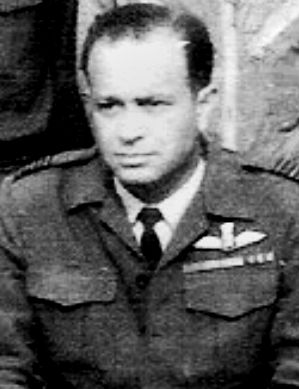 Group Captain Aubrey Leslie Michael was commissioned in the Flying Branch of the Indian Air Force in November, 1946. After serving in active flying squadrons for years, he was selected to attend the Pilot Attack Instructors Course in the United Kingdom which he completed successfully. In 1962, he was selected to attend the Staff College at Wellington. He has commanded two squadron-one fighter bomber squadron in the rank of Squadron Leader and an Air Defence squadron in the rank of Wing Commander. He has been Joint Director of Tactical Operations and, more recently Director Offensive Opera-tions. In these two appointments, his main objectives were study and analysis of the employment of fighter bomber aircraft. He has worked out the utilisation of different types of aircraft in the ground attack, fighter recce and offensive support roles. These studies proved to be of considerable value in working out detailed tactical plans. He was also of great help in planning bomber operations. Throughout, Group Captain Aubrey Leslie Michael has rendered distinguished service of an exceptional order. | ||||
| Reference: | Gazette of India Notification Dated : 26 Jan 1972 Number: | ||||
| Gp Capt | Ramesh Chandra Jain 3546 AEL | Unit : -N.A.- | Award Date 26 Jan 72 | Announced 26 Jan 72 | |
| Details : | Group Captain Ramesh Chander Jain was commissioned in the Aeronautical Engineering (Signals) Branch of the Indian Air Force in December, 1948. He took over command of a Signals Unit in November 1969. Certain special tasks in specialized and sophisticated electronics field were entrusted to his unit. Not only did he develop sophisticated electronic equipment, which were urgently required, he undertook and successfully completed production of sufficient quantity of these items within a very short period even though the resources of the unit in equipment, spears and personnel were extremely limited. He guided his unit urgent operational requirements. His efforts built up and established a sophisticated electronic field which helped the Air Force in the recent operations against Pakistan. Group Captain Ramesh Chander Jain thus rendered distinguished service of an exceptional order. | ||||
| Reference: | Gazette of India Notification Dated : 26 Jan 1972 Number: | ||||
| Gp Capt | Emmaneul Fernandes 3577 F(P) | Unit : -N.A.- | Award Date 26 Jan 72 | Announced 26 Jan 72 | |
| Details : | 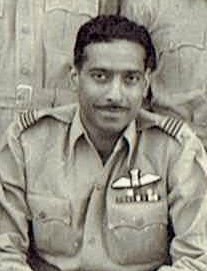 Group Captain Emanuel Fernandes was commissioned in the Flying Branch of the Indian Air Force in April, 1949. He has held a variety of flying and staff appointments. In all these appointments, he has displayed professional skill of a high order and organising ability. Shortly before the outbreak of hostilities with Pakistan in December 1971, Group Captain Fernandes had been appointed the commander of a forward Station. Prior to his taking over, the station was functioning as a care and maintenance party. Against heavy odds, Group Captain Fernandes reorganised his unit with the limited resources at his disposal, and brought it to a high degree of operational preparedness. During the hostilities, his base was subjected to repeated enemy air attacks, and yet he was able to meet the commitment of close support to the army and counter air operations. He has rendered distinguished service of an exceptional order. | ||||
| Reference: | Gazette of India Notification Dated : 26 Jan 1972 Number: | ||||
